Guest Post
-
2021 KLAS Users' Group Business Meeting Minutes
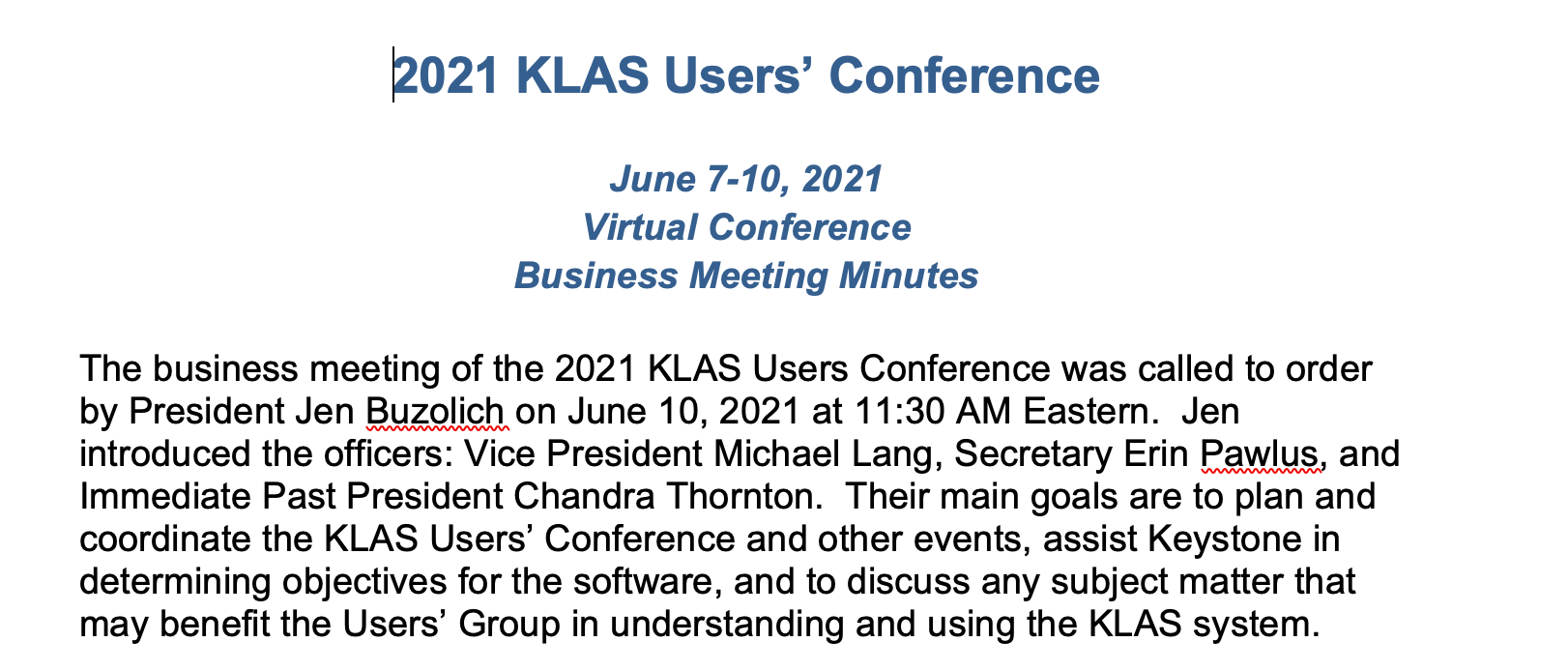
The minutes of the 2021 KLAS Users' Conference which occurred on Thursday, June 10 at 11:30 AM Eastern Time / 8:30 AM Pacific during the 2021 KLAS Users' Conference are below.
-
A Valentine to All KLASUsers

On February 16, 2024 Maureen Dorosinki, Vice President, KLAS Users' Group shared the below message on the KLASUsers' listservs. Based on the overwhelming positive response to it, we're also posting it here so it is easier to find and share with others.
Valentine’s Day means a variety of things to many people in various stages of life. It used to mean buying a pack of assorted valentines shaped like Garfield and writing your name 30 times to sign them and sneaking in a smiley face to the cute boy. It meant hoping you were going to get a carnation in high school, and be able to carry it around, and then, have your face burn with embarrassment when you didn’t get one. It meant finding The One, and today means you are happy making chocolate chip cookies from scratch after work because those are the only sweets you can justify eating on the terribly restrictive cholesterol diet you are on.
At work, it also means something altogether different, it has turned into caring about something bigger than us and doing it for the most part without ever meeting the people you serve. It means staying late to make sure the e-readers are plugged in so they can go out the next day. It means sticking with the call even though you have 20 more to do and the phone keeps ringing. It means trying to get ahead on the hamster wheel because you care. You care about the thousands of people you don’t see, as much as you care about the few you might talk to.
But I’m asking all of us to do one more thing this Valentine’s month. Take a day where you can allow yourself to fall off the hamster wheel and make one extra call. You could call that person who always has something positive to say and is so lovely you wish everyone was like them. No, I challenge us to call that person you dread calling. The person who you know lives alone…and is crabby. Call them and just say hello. Call them and thank them for being a patron. Reach out with empathy. You may think you know their story, but we only know one page of their story. Maybe even a half page, with something spilled on it.
Make this Valentine’s include giving without expecting something in return. You gave the gift of yourself and made someone’s day a little brighter, a little easier.
Speaking of easy, KLAS makes all your days easier. They can get us out of a pickle and show us that maybe something is going to be easier than you thought.
Post something on the KLAS Users forum! You may get something done that changes your procedures and moves your department forward.
Valentine’s Day used to mean waiting for gifts and being able to show off what you got. Now it means giving quietly because you truly care and know what working for a higher purpose means.
Maybe not everyone is completely there, but trust me, one day you might be.
Thanks for all you do to support each other, and the patrons.
-
Back to School: How 3 KLAS IRCs Prepare
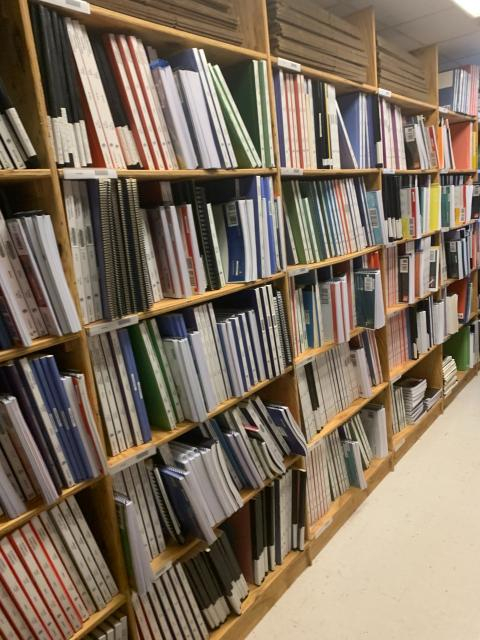
Every Instructional Resource and Material Centers throughout the nation is trying to do the same thing, and that is to make sure that every student with a visual impairment has what they need. In the month of August all schools will be returning to session, this means a stress test of all our processes and practices. There is no one size fits all for resource centers, we all meet the need in our own way. But, there is power in discussing how we do what we do. It gives the space for others to be creative with ideas they may have not thought of. At the very least we might not need to re-create the wheel because our neighboring state might have an amazing solution to the problem that we are facing. Below are three narratives of how Oklahoma, Colorado and Arizona prepare for the summer and the start of the school year:
From Pepper Watson, Oklahoma Instructional Materials Center:
Around the first week of May, we send out an email asking for the names of all graduating seniors. In June, we also do a query for seniors and compare lists to see who is actually graduating and who will remain for Adult Studies. We then make sure all graduating seniors have returned all items checked out to them. At this point, we either mark them GRADUATED and delete their account from our system (required by our State Dept of Ed) or contact the TVI about items still needing to be returned.
All textbooks are due back to the AIM Center by June 15th so the first thing we do at the beginning of June is find out what books have not yet been returned and send out notices to those TVIs. (Most of our school districts get out May 15th so we have most materials back by the end of May).
During June we also conduct inventory on all 5822 shelves in the AIM Center. I have a staff of four and it takes us all of June to get this completed. Upon completion, we run an inventory report and begin to restock our shelves for the next school year. (We do this throughout the year, but we concentrate efforts now when school is out, and we have a bit more time).
I, personally, do a lot of KLAS maintenance during this time. Everything from lost items to creating new equipment and textbook holdings to updating patron records. If we have a copy of the new APH catalog, I also use this time to update prices in the vendor catalog in KLAS. This saves a bit of time later down the road and also gives me an idea of how much price increase we are dealing with overall. (This year the price increases have been steep, especially on textbooks!)
I divide my federal fiscal year into quarters on my calendar. I then divide my total FQ funds by 4 and make note on my calendar how much I should have spent by each of these dates. I started doing this about 7 years ago and it’s an easy way of tracking funds, so we aren’t going crazy the last month to spend all of our money. We are very fortunate in that we have moveable shelving and have a lot of storage space. Therefore, we can keep our shelves stocked and have very little wait time to get products out to our students.
From Jim Olson, Colorado Instructional Materials Center:
Start early: CIMC has a book order deadline of April 1st every year. For example, the deadline for 2022-2023 book orders was April 1, 2022. We will accept book orders any day of the school year, but do not promise that the TVI will have even one volume of braille if the order is received after the deadline. Of course, we do everything possible to fulfill every book order no matter what time of year it is received. This puts some responsibility on the TVI to coordinate with the classroom teachers to ensure book orders are submitted in a timely manner.
CIMC staff tracks which students typically receive books from us and will reach out to TVIs if they have not ordered books for their student by the deadline. TVIs are busy people! They have a lot on their plate, caseloads change often, and students move around. Contacting the TVI if they have not placed book orders for a particular student saves the CIMC and the TVI a lot of stress later on.
Ship book orders to districts before June, if possible, if we are pulling from our inventory or if the vendor is able to fulfill our order early. A lot of our TVIs like this because they know they have the book waiting for their student when school starts in the fall. This also lessens the workload for the CIMC staff in August since we have already shipped. We try to clarify with TVIs when they place the order whether or not we can ship during the summer months. Making a note in the Material Request module of Klas regarding dates we can or cannot ship for a particular order has helped us stay organized. If you make the note when you create a new order (in the shipping instructions box) it will print on the packing slip. Easy for staff to identify if we are shipping or holding the order. We also put the email address of the TVI who is receiving the book in the shipping instructions box. Any time we ship orders we send a quick email to the TVI so they know to be watching for the shipment to arrive.
Mid-July: Contact braille vendors who still have open orders. Run PO/Requisition listing report in Klas. If possible, we try to let TVIs know the status of their open orders before school starts.
From Jared Leslie, Arizona Instructional Resource Center:
We begin the conversation with teacher in our districts when we begin the Federal Quota Census. In January when we are sending notice about the census, we include language about best practices of thinking for the next school year. This could mean preparing for your equipment needs or your textbook needs. After the census is fully completed in March, we begin our conversations that are singularly focused on equipment and textbooks.
This email notification shares with all teachers what items are checked out including consumable items. Then the teacher indicated what items we expect back at the resource center for inventory and quality checks. If an item or text is going to be utilized next year or over the summer teachers have the option of renewing a checked-out item. After the renewals we begin to start receiving the returns, we get about 2,500 to 3,000 different items that are returned during this time. It takes us about 4-5 weeks to fully process the returns after they are all fully received. At that same time, we are fielding new equipment orders and new textbook orders. Our Quota orders do not get filled/ordered until about halfway through the summer. Our textbooks start ASAP.
Once returns are completed and all our titles are placed with our transcribers, then preparation for shipping begins. The space that we used for receiving returns transitions to a staging area for outbound shipping. We pre-box up all of the items that have been requested waiting for the week for when teachers return. Once we have a confirmation of the teacher work week in a district, we then ship out the completed orders. This allows for items to have less of a likelihood of being lost or misplaced.
As students arrive, this prompts another ordering wave, which is considerably smaller than the summer wave. But, because of this fact we need to maintain some capacity for item fulfillment and braille transcribers.
-
Bestsellers by Decades
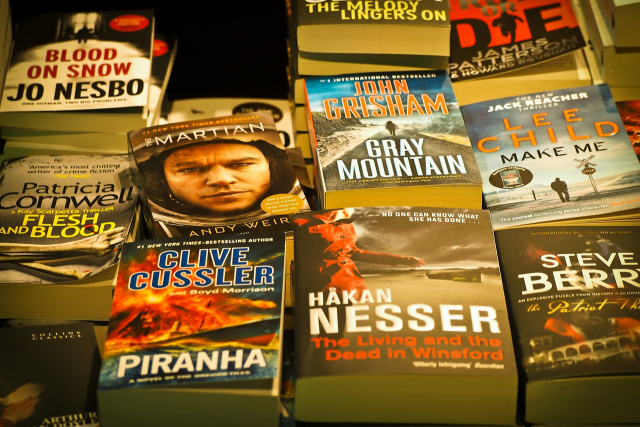
This is a guest post by Maureen Dorosinski, Librarian / Production Supervisor, Florida Bureau of Braille and Talking Book Library Services.
The question:
Meagan from FL1M had a question: “Do we have exclusions for certain dates? Many of our patrons are auto select from their preferences, but only want books from a certain time period.”
Nancy at KLAS suggested we could set up subject codes based on dates. For example, instead of putting everything in the "Bestseller" category, a Bestsellers of the 1990s, Bestsellers of the 80s, category.
First Stop:
Nancy completed a process of setting up the bestseller codes for the various decades. She set the following in place, and filled them:
- BEF50 / BEN50 - fiction and nonfiction prior to 1970
- BEF70 / BEN70 - fiction and nonfiction from 1970 - 1979
- BEF80 / BEN80 - fiction and nonfiction from 1980 - 1989
- BEF90 / BEN90 - fiction and nonfiction from 1990 - 1999
- BEF00 / BEN00 - fiction and nonfiction from 2000 - 2009
In putting these codes on the titles, she also removed the generic BES, BEF and BEN codes, so what is remaining in those subject headings are the more recently published titles.
Second Stop:
Since NLS uses an amalgam of LA Times, New York Times, USA Today, and Washington Post bestseller lists to tag books, our cataloger Dina took things to the next level and further populated these tags from NLS by searching all the New York Times Bestsellers, and adding the appropriate subject headings to previously unnoted bestsellers.
To streamline the process, she went to Bookshare.org. They have a section of the top 10 fiction and non-fiction titles from the NYT list, these lists round up the titles without repeating them, and can be filtered by year and month.
Going Forward:
Nancy says the automatic codes being used are BES, BEF and BEN. When MARC records come in, those are updated. If, in your review, you see a recently added title that was originally published in 1970, you might want to add the 1970 bestseller code to it, but other than that, those should stay pretty static. And yes, remind the RAs that these categories exist, for either selection or exclusion.
Maybe another library could continue, Dina says we'll have to add subject headings for the 2010s and (eventually) the 2020s and assign them as appropriate. Maybe you will share their queries with us to import!
Get Bestsellers By Decades at Your Library:
I have attached the text queries with all the books we have tagged in each of the categories. To apply them in your catalog:
- Add the new subject codes as listed above to your catalog using Headings Maintenance.
- Import the first query file.
- Use the Change Headings - Query Set tool to apply the new heading to the Query Set and remove the old heading.
- Repeat for each of the query files.
I’m sure KLAS would help out if you need them!
Downloads:
Thank you!
Maureen in FL -
COVID-19 and North Carolina LBPH
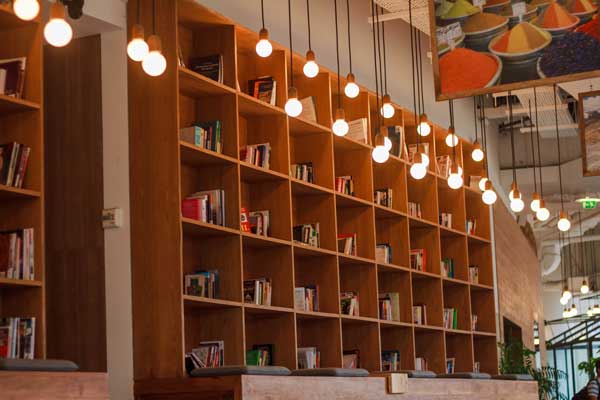
Our KLAS Users' Group officers contacted some KLAS users to ask them to share how their library / organization is faring and what policy, service, or other changes they may have enacted in response to library closure or limited staffing related to Covid19. We welcome submissions from any KLAS user who wants to share their experience during this time. Please contact Chandra Thornton, President, KLAS Users' Group or Drea Callicutt, Keystone Systems if you're interested in contributing a post.
Our next guest post in this series is from Craig Hayward, Systems and Digital Services Librarian at NC LBPH.
North Carolina in a time of COVID 19
North Carolina started hearing about what was happening in Washington State, and their library staff, in late February-early March and thanks to the information that the library there provided, we started preparing for how to quarantine items and figuring out how staff could work either from home or in socially distanced situations in the library. The most difficult part of the situation in planning would be with our circulation staff of 5 who most of what they do is handling physical items and have to work in close physical proximity for some parts of their work? Still a plan was set in motion and we prepared to transition to whatever we would be presented. The second week of March, the library closed to the public officially. This also meant the volunteers were not allowed into the building, making some of the work we do, in inspections and audio narration more difficult.
On March 23, 2020, the Governor of North Carolina gave the Stay At Home Order, mandating that all employees were to work from home, or go on administrative leave, if they could not do any work at home. A week prior to that, my own county (Durham) had issued the order which meant that I would have to start working from home sooner. At the time, 5 of us had already begun teleworking, leaving most of our staff of 25 in-house working, while plans were made to bring our work home for real. There was a large backlog with the state in getting laptops so staff could work from home, so a number of staff brought in their own laptops, while waiting frantically for the state to get them something more “official”. All of this was so that KLAS could be installed and work could happen from home. This would mark a new chapter for many of what work looks like now.
Needless to say there was a big shock to the system, both for staff and patrons. No one is there to answer the phone, just reply to voicemail and email. Ironically, the library is getting a new phone voice over IP phone system, but the shutdown happened at the absolute worst time in this project, since the old system offers no way to forward calls on. The new system will allow you to easily forward your office number to your cell phone. The only time I’ve been back to the library since the shutdown began was this past Tuesday to test out a new piece of hardware to make sure it worked. In the meantime, special arrangements have been made to get the library’s main phone line to ring to another one at the State Library so voicemail could be collected and accessed by our staff.
Without anyone available to run duplication on demand orders on cartridge, that service sits awaiting our return. Our only answer is to get patrons setup on BARD and / or use the local downloading resources we have. To keep chaos at the post office as minimal as we could, we asked patrons to hold onto their materials until we were open again. But patrons can only respond as they do and material piled up in the mailing facility. As a result we then started an occasional truck run to pick up mail hampers. The first run, amazed our driver with the number of hampers sitting and waiting to return materials to the library.
Since our shutdown, only 3 staff members, myself included, have even entered the building at any point for any amount of time. No one is allowed back in until we open. Even once we open, the number of people allowed in the building will be done in phases. Phase 1 allows for a max of 8 people in the building at any given time. Staff will rotate days in and out. At the time of this writing, we are closed to the public and staff until further notice, potentially until the end of May.
Staff working from home pick up voicemail messages from a central voicemail box, setup temporarily by the State Library, and return calls. They also monitor and answer the library’s email box. For anyone answering we ask that they block their phone numbers for privacy. If the patron does not accept blocked calls, we do our best to work to relay information. One option we have looked at for greater transparency is a Google Voice number that would be branded with State of North Carolina to keep it private. But that’s temporary and may take some time. We look forward to the day we get our new voiceover IP phone system to help keep our teleworking experience more normal by allowing our office numbers to connect while out of the library, but our temporary solution has allowed us to continue serving our patrons during a difficult time.
Once a week either the Director of the library or the State Librarian makes a trek to the library and retrieves new patron applications, faxes, and bits of other mail. These items are worked on by our Public Service staff from home.
Our volunteers will return when the public does. Book and magazine production in our local recording studio has been put on hold. However, a couple of us on staff are using home recording as an option (voice recording apps on mobile devices, Audacity on laptops) to produce "Tar Heel Talk", the library’s newsletter. This is a particularly popular publication for our readers. We have also turned to revamping our audio offerings with making "Tar Heel Talk" into a podcast and creating a new podcast that showcases locally recorded books and magazines available for download. With "Notable On NOBLE" we give listeners a bit of the annotation and the first 2-3 minutes of the first chapter of a book or a magazine articles to encourage patrons to try out some more materials and at least offer them something to read. This joins the already popular "Heard Any Good Books Lately?" Podcast and a couple of new offerings are coming soon.
Our machine unit sits and waits to fulfill machine requests, until the library opens again. Machines are received by mail and brought into the library with other items from the post office. All machines have a 7-day quarantine period, so the time away has helped in this regard.
On this topic when we were opened the standard quarantine period for books was 3 days. This will continue once we return and for the foreseeable future. One benefit of the shutdown is that we have decided to ramp up duplication on demand efforts and when we return many individual digital talking books cartridges will be withdrawn from the collection and set aside for recall rather than checking them back in.
Some bright spots have come out of this situation, also. First off, we have the implementation of Live Chat on our library’s homepage. In these times when it’s hard to reach staff directly by telephone and email, this service acts like a kind of instant messaging service to allow staff to help patrons get books and directly answer questions about our service and happenings in real-time. Staff were hesitant that patrons wouldn’t use it, but it has been well received. It also has helped strengthen our collaborative efforts with the State Library by adding our library to this service. They can now more easily direct people that come to their side back to ours, and it allowed us to evaluate the product they use for accessibility. It also has led to some interesting real-time conversation with patrons and their appreciation of having a way to connect.
Most of our staff have been working on the larger NLS Unrated Books project while working at home. This time out of the library has meant having to fill in gaps and this situation is useful.
Another project that this pushed forward was a mass migration of groups of staff-direct, non-automation, service patrons. Having the time out of the library to do this has been a real help. The bulk conversions to duplication service have happened and then the reader advisors (when not answering questions) have been able to go in and tailor first run service queues for a batch of around 1800 patrons new to this type of service. This has made this project more manageable.
This has also been a chance to update parts of our website to better serve our patrons. Things like our local download site, NOBLE, and creating new service spaces with an expanded and better organized podcasts section.
On the topic of local collections, we’ve been able to have time to transfer our collection in totality from our local network attached storage device to books.klas.com for better access by our 3 Scribe units once we go back to open operations. At this writing we have just gotten approval (in record time) for adding a 4th Scribe unit, so that we will can keep up with the demand of daily orders (which average around 300 per day) and keep a walk-in service for patrons, once we are allowed to reopen our building to the public.
It has accelerated the use of communication tools like Microsoft Teams. Prior to this situation no one really saw a need for it, other than our administrative team since they were having meetings and they had been communicating daily. Now everyone in the library uses Teams at various levels. Some of us talk daily through it directly with various people the way we would normally go down to each other’s offices and have conversations. Having my Director call me through Teams the first time was quite a surprise in my house.
Zoom meetings have become a more regular happening, rather than a special occasion. They are just the way we have larger meetings of groups, from the entire staff of the State Library to Departmental meetings within our own building, and for planning events like an upcoming retirement party.
The other avenue that opened up for communication has been a regular Wednesday check-in for groups of staff by text message. This is something that will stay around while we continue to telework and probably beyond as we operate with greatly reduced staffing in the library building itself.
Overall, I can’t say that the situation happened at an ideal time. Conferences got postponed and face-to-face time with staff is missed greatly. But perhaps this situation could be a catalyst for changes to the program that were already starting and maybe for a change in attitude about virtual (non-physical) materials services, like downloading and talking to staff through a website for our patrons.
Every major event that happens and changes us culturally has an impact of how life goes on after ward. Once you get used to this way of working and living, it’s hard to go back to the way you did things prior.
-
COVID-19 and Tennessee Resource Center for the Visually Impaired
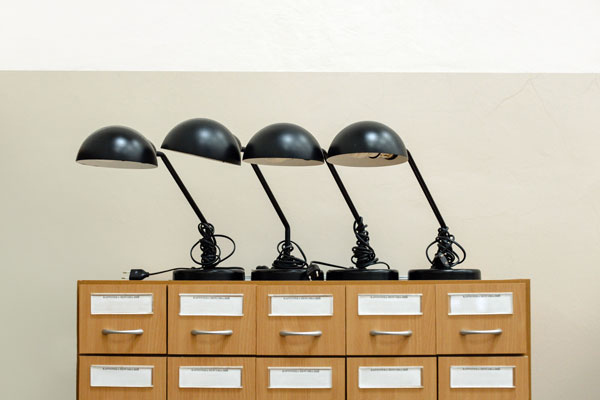
Our KLAS Users' Group officers contacted some KLAS users to ask them to share how their library / organization is faring and what policy, service, or other changes they may have enacted in response to library closure or limited staffing related to Covid19. We welcome submissions from any KLAS user who wants to share their experience during this time. Please contact Chandra Thornton, President, KLAS Users' Group or Drea Callicutt, Keystone Systems if you're interested in contributing a post.
Our next guest blog post in response to this request is from Kathy Segers, Director of Accessible Instructional Materials and Outreach Services, Tennessee Resource Center for the Visually Impaired.
TN RCVI COVID-19 Plan Implementation
As a result of the COVID-19 Pandemic, Tennessee RCVI and Outreach Services, has developed a detailed action plan to support local school districts to be able to continue to serve students with visual impairments, by providing accessible instructional materials and devices to the district and or the parents. The following is an outline of the activities that have been put in place.
- A copy of the TN RCVI COVID-19 Guidance was sent to all Directors of Special Education and Teacher’s of the Visually Impaired in March of 2020.
- A copy of the TN School for the Blind Outreach Department Guidance was sent all Directors of Special Education and Teachers of the Visually Impaired in March of 2020.
- TSB Outreach teachers are working with each local school district that they serve and are offering support for the students on their caseload which focuses on providing access to the instructional materials that the district is using. This is based on guidance from the TN Department of Education.
- Local districts were asked to share their home contract information to facilitate communication while everyone is working from home. This was well received.
- Local districts were asked to order materials needed by their students at home using KLAS. They were asked to submit the parents address where the student materials needed to be shipped before placing the orders so we would have time to enter the data in KLAS. Students names were not used to protect privacy. This has worked very nicely.
- TN RCVI has shipped on demand APH Materials and equipment that students were previously using in their local school districts to the homes of students for them to use to have access to the materials used by the local school districts. For example, if they used a Perkins Brailler or Matt Connect prior to the Pandemic, we would ship one to the home if the student could not gain access to the one at school. No new devices that the student has not previously used are being sent at the present time.
- TN RCVI has sent daily information out the parents, TVI’s, and LEA’s about accessible trainings for teachers and students, i.e., free JAWS/Zoomtext for student until June 2020, APH ExCEl Academy Training for Students with VI, Etc.
- RCVI just launched its May Newsletter, ACCESS VI with instructions for ordering and returning materials.
New protocols for sanitizing equipment and books that are returned to TN RCVI have been developed are being used following EPA and CDC guidelines - All staff at TN RCVI are wearing gloves and masks when in the building and are socially distancing, We are trying to have only one or two staff members in the building at one time for now.
If you have any questions about our COVID-19 Response, please contact me at
-
COVID-19 and the Arizona Talking Book Library & Instructional Resource Center
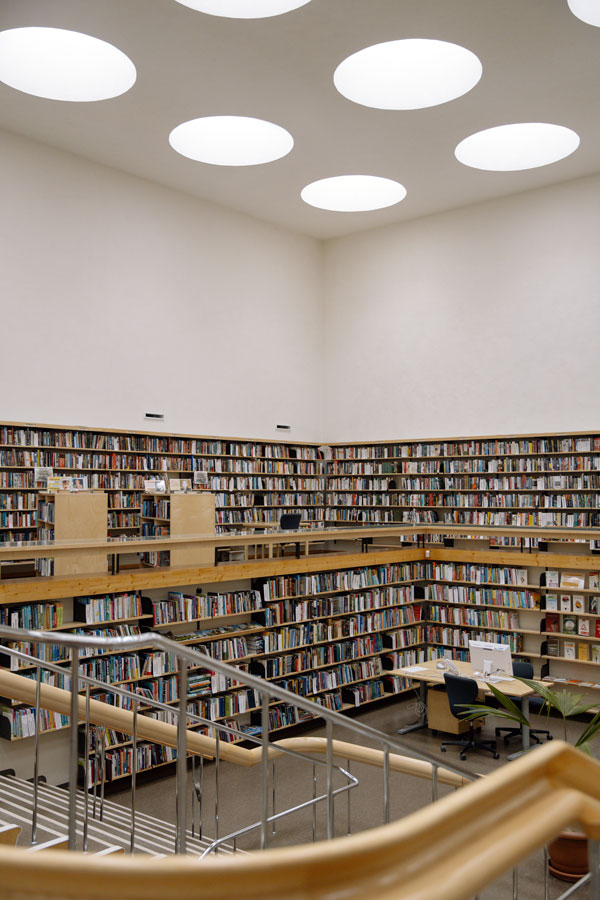
Our KLAS Users' Group officers contacted some KLAS users to ask them to share how their library / organization is faring and what policy, service, or other changes they may have enacted in response to library closure or limited staffing related to Covid19. We welcome submissions from any KLAS user who wants to share their experience during this time. Please contact Chandra Thornton, President, KLAS Users' Group or Drea Callicutt, Keystone Systems if you're interested in contributing a post.
Our next guest post in this series is a collaborative one from Erin Pawlus, Assistant Administrator, Arizona Talking Book Library, and Jared Leslie, Director of Media Services, Foundation for Blind Children.
Our teleworking adventures at the Arizona Talking Book library began on March 23, 2020. At that time, we had about half our staff working on site on an alternating schedule, with the rest working from home. Since then, we have managed to pare it down to about 5 people in the building at a time. Other than the regular trill of phone calls, it has been remarkably quiet. At the time of this writing, we are closed to the public through May 15, 2020, so we encourage our readers to contact us by phone or e-mail.
So, who will you find if you were to tour our library? A supervisor is always on site, as well as someone to forward phone calls. Staff who work from home pick up their voicemail messages and return calls. They are currently using their cell phones and we ask that they block their phone numbers for privacy. If the patron does not accept blocked calls, someone from the office will act as the messenger in those cases and relay information. We are exploring our options for improving phone service while teleworking, but our temporary solution has allowed us to continue serving our patrons during a difficult time.
The Certification Specialist, and staff providing backup, review incoming applications to confirm eligibility a few times a week instead of daily. Since the Reader Advisors are not in the office to receive the applications, basic contact information is entered into KLAS so that the librarians have enough information to call and set up service.
Our volunteers have not yet returned to the library, so book and magazine production in our local recording studio has been put on hold. However, our Studio Manager is back in the booth to narrate Arizona Highways magazine. This is a particularly popular publication for our readers.
The machine agents are available by phone at their home offices to accept requests for equipment and to assist with BARD. Twice a week, the Machine Services Supervisor comes in to prepare mail shipments.
While mail service for books has continued, it has been necessary to decrease the number of materials that we send each day so that we can limit on-site staff and maintain social distancing in the mailroom. We started with a maximum of 650 books a day – a far cry from the 2000 we typically allowed. With a little tinkering we were able to move the needle back to 1000 and have struck a decent balance. We also quarantine books and machines for seven days before they are available for the next patron, which is another important step that has nonetheless slowed down mail processes.
We were soon alerted to an interesting consequence of not serving all patrons needing books every day. While we understood that it may take several more days to ship, patrons were calling in who had not been served in weeks. When we reviewed the issue with Keystone, we discovered that it was because we were giving priority to patrons who were Nightly List Only and being served from specific book requests, leaving the Nightly Autoselect patrons being served by general reading interests to languish and the end of the list. In a normal world, this makes sense – if a patron has specific requests, they should be served before the patron who is happy with what we have in stock. However, this is not a normal world. We switched the order and gradually chipped away at our backlog.
The sudden and unexpected changes to our schedule and workflow have accelerated other projects, however. For example, our agency had provided training on Microsoft Teams starting late last year, but we were not quick to make it a part of our daily routine. Now, we all stay in regular contact through chats and virtual meetings.
Our library has also received the Scribe for duplicating multiple books on a cartridge. We had completed a staff and patron pilot and were starting to introduce it to patrons as they called in with book requests. As our traditional mail service slowed, we offered it to our patrons as a quicker option - we have been able to maintain a next-day turnaround for these orders. While it has been a unique challenge to launch a new service during an uncertain time, many patrons were willing to give it a try. Since early March, we have transitioned over 900 patrons and currently mail out an average of 160 cartridges a day!
We stay in contact with others in our community and partner organizations. Our Instructional Resource Center for Arizona, The Foundation for Blind Children, and the Arizona State School for the Deaf and Blind, continue to request print/braille books that are produced by the National Library Service. Our Youth Services and Engagement Librarian has worked with Teachers of the Visually Impaired (TVIs) to create weekly virtual programs for their students. She also plays with the recently purchased Cricut machine to prepare tactile cut-outs for the upcoming Imagine Your Story Summer Reading Program.
We asked for an update from the Instructional Resource Center for Arizona and they informed us that they began teleworking on March 16, 2020. At a full capacity, they have nine people that are on site supporting thousands of students throughout the state. Most of the team utilizes a desktop computer, so like most organizations they had to secure more laptops to allow for remote access. However, their tech and inventory department was able to secure them the weekend before telecommuting began. Within a day of their tech department receiving the much-needed workstations they were able to get one in the hands of every team member.
Onsite they limited the number of staff to two and had the remaining seven work from home. Each day the staff members on site rotate. This system has allowed for many unintended benefits. They have two main functions: 1.) Producing physical braille and mailing that to districts and customers. 2.) Pulling federal quota items and mailing them out to districts and students. Having rotating team members allowed for cross training for every team member, and those that had specialized roles now were coaching how others could jump in and help.
Everyone has found a way through with trial and error and continue to discover new or different ways to do business. We are not sure what everything will look like in the future, but we have picked up some valuable new skills and a shifting perspective on what is possible... more than we could have imagined. I am encouraged by my staff and our patrons, who have demonstrated amazing grace and resiliency during a high-stress time. Listening to the voices, and sometimes the tears, of our patrons on the line has made it clear to me how truly essential this program is in the lives of the people we serve.
-
COVID-19 and the California Department of Education Press

Our KLAS Users' Group officers contacted some KLAS users to ask them to share how their library / organization is faring and what policy, service, or other changes they may have enacted in response to library closure or limited staffing related to Covid19. We welcome submissions from any KLAS user who wants to share their experience during this time. Please contact Chandra Thornton, President, KLAS Users' Group or Drea Callicutt, Keystone Systems if you're interested in contributing a post.
Our next guest blog post in response to this request is from Jesse Medina, Manager of the California Department of Education Press.
CDE Press has been the publishing unit of the California Department of Education (CDE) for over 50 years. Until last year, CDE Press operated completely out of headquarters, located in Sacramento, California. I have been with CDE Press, in various capacities, for almost 14 years. Ever since I started, CDE Press staff could only fulfill orders on computers at work and customers had to call, email, or even fax their orders in. After years of trying to move our sales online, we finally completed the transition in August 2019. CDE Press was finally able to provide 24 hours a day/7 days a week access to our customers all over the world. It ended up being perfect timing for what would happen in 2020.
When the direction from the CDE Executive Office to try and telecommute as much as possible in March, CDE Press would be equipped to handle the needs of customers while also allowing staff to work from home. It took a few days for staff to get used to (me included) but I am thankful that we were in position to be able handle this transition as smoothly as we did. A lot of credit goes to my staff, who were willing to take on different tasks, be available at odd hours, and work with our customers to accommodate their needs and situations as best as we can.
On a personal note, I have been appreciative of this time that I get to work from home. My wife has been working from home for several years so she was used to it. I get to spend more time with her and our three dogs. They love to go back and forth between the office and where I work to supervise us. Sometimes they even show up, both visually and audibly, in my virtual meetings. We also live close to both of our parents and have been able to share those resources that have been in short supply these past few months. We try our best to support our local restaurants and businesses as we know they are having a tough time with the restrictions.
With my staff, my family, and work, I am very thankful and consider myself very lucky! I hope you all stay safe and healthy!
Jesse Medina, CDE Press Manager
-
COVID-19 and the Florida Braille and Talking Book Libraries
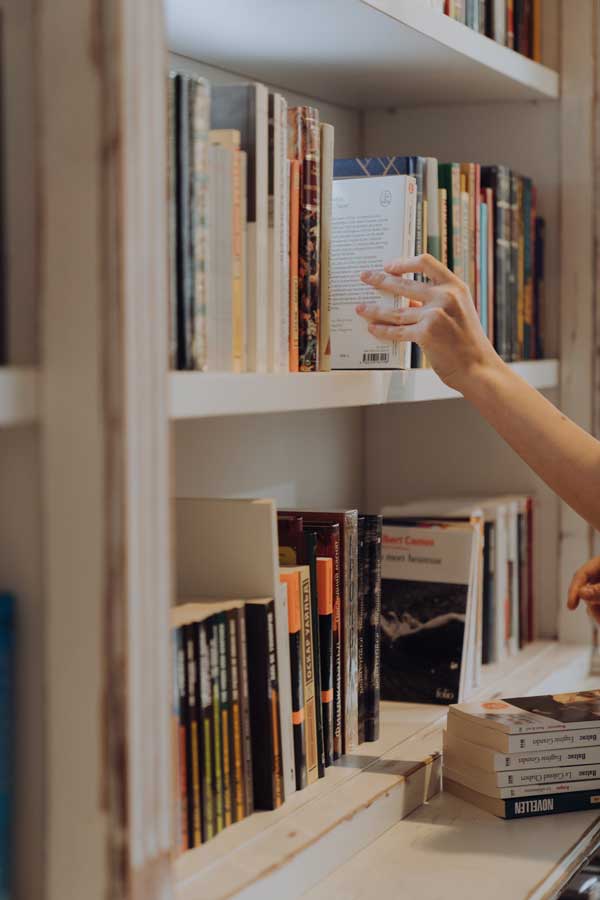
Our next guest blog post in response to this request is from Maureen Dorosinski and the various regional librarians of Florida.
FL1A
The Library is part of the Division of Blind Services, which is under the Florida Department of Education. First the school closings came, then the stay at home order. We were told to telework as much as possible. We were an 'essential service'. Our circulation and production staff core duties are not able to be performed remotely, while reader advisor services and other responsibilities could be performed remotely. Others applied for telework, trying to find a way to be out of the library around people, but without enough leave to cover the duration of the stay at home order. We have vulnerable category staff. Additionally, our OPS part time staff in circulation, had decided to simply take unpaid leave. This left circulation extremely short handed. About half staff, when we were already two positions short. The outlook is bleak and morale is low because now there is a hiring freeze and one position is on hold. One production staff member worked in both areas simultaneously.
Then, COVID came to the library. We were told "someone in the building tested positive", and were given the last date they were in the library, the details were not clear but then, the staff just cleared out. We are behind and had been shifting quarantine back, and also, had been operating day to day as to who was in and able to do what.
All we can do now is wait until April 30 and see if there are any changes. Staff have contacted me frantic and desperate to get more information...and I have none to offer. I wonder myself what if someone tests positive in this time. Do I trust these results will be disclosed? What do I do for myself, and my family, if I have vulnerable people in my life?
After I wrote this, I opened it up this morning, Friday, April 24. Some else on campus has tested positive, and now we are out until May 7. That above scenario was again repeated when we were told we needed to close because someone else tested positive on campus, rehab center staff, and then we adjusted the reopening times twice. Luckily KLAS staff as well as subregional staff were able to help button up the day, and redistribute service throughout the rest of the open libraries. A good deal of patrons will be able to be served with the FL network pulling together!
Rereading my notes, everyone is even more confused, and my morning was consumed with getting information and timesheets and testing sites, and creating telework tasks for those who do not have any sort of technology at home, nor a job that has a real remote counterpart and looked up and breathed and just hoped everyone turns out okay.
On service to patrons: Kim Peters at FL1D had a great idea, to ask for a report of patrons who have met their limit so she could go into their accounts and raise their limits right away. John Owen pulled together such a report, and she was able to raise many patrons so service would continue. He then did a similar thing for FL1A, and we are applying it as well. Thousands of patrons will now have service continue uninterrupted, while their returns wait at the post office, or on our loading dock in quarantine, until we get back into the office. For patrons that had reached their NSCutOff after January 1, 2020, we would raise their limit by 10 books. This would target those patrons most likely to benefit from the increase, those that are most active. Patrons not at their NSCutOff yet are being served by open libraries now and books received after April 22nd will be from those branches. Once the books are returned and checked in these patrons will be eligible for more service.
All of the SRLS who are open, are to be commended for their willingness to help by raising their card run limits in order to serve Florida. We are so grateful for their dedication and extra work during this time:
- FL1G, Sarah Smedley and her team in Palm Beach County
- FL1H, Bill Forbes and his team in Broward County
- FL1K, Debra Martin and her team in Brevard County
- FL1M, Megan Magee and her team in Pinellas County
- FL1L, Greg Jackson and his team in Escambia County, West Florida Public Library
The same gratitude goes to the entire KLAS team as well, especially John Owen and Nancy Honeycutt.
-Maureen Dorosinski, FL1A Librarian
FL1C
Meeting patrons needs by mail during Coronavirus
Due to the high rate of COVID-19 cases in Miami-Dade County, the Miami-Dade Public Library System closed to the public on March 18, 2020. On Thursday March 19th my supervisor contacted me about the possibility of using our Borrow-by-Mail service to send out the backlog of holds that customers were unable to pick up due to branch closures. Borrow-by-Mail is a fee based service that allows patrons to place requests from our catalog and have them mailed to their home address for a $4.00 fee. It was decided that we would waive the fee and start asking branches in groups of 3-4 to call the patrons, ask if they want their holds shipped and ship the books to our Books-by-Mail and Borrow-by-Mail Departments called Connections. Connections is located at the North Dade Regional Library right next to our Talking Books Department. I supervise both departments.
We manage Borrow-by-Mail using Polaris and a Neopost machine. It is a slow process but we can incorporate tracking numbers which are listed in the patrons record. It is also nice because Polaris generates mailing labels and a letter with instructions. It was decided we would eliminate tracking numbers to speed up the process since we were not charging for the service at this time. We processed about 140 items over three afternoons before we were sent home on March 24th. After we were sent home, a team of employees were asked to report to the Main Library and branch staff were asked to check out the holds that patrons wanted and send them to Main to be mailed out. They decided to bypass the Borrow-by-Mail function to expedite the processing. Hundreds of holds were sent out by the staff working at the Main Library.
While that was happening, one of my staff from Connections, one from Talking Books and myself were set up with a laptop with remote access to our desktop so we could start placing requests for patrons. We discovered KLAS and Polaris worked surprisingly well this way. The first day I was able to access KLAS, I began having the Talking Books phones forwarded to my personal cell and I received over 30 calls. Many of the patrons were extremely concerned about the well-being of the staff. They were also tremendously grateful that we were taking requests and that other libraries around the state would be shipping items out.
Unfortunately, I began receiving calls and emails that some of our patrons had not received the Borrow-by-Mail holds they had been expecting. As it turned out, a large shipment was sent to Connections shortly before we were sent home and arrived after we had closed up. Doris, my Connections Manager and I ventured back into North Dade Regional and shipped 178 items to 76 customers in 7 hours. Then, I started receiving calls from Talking Books customers stating they weren't receiving their cartridges. Well as it turns out, some of the Talking Books has been assigned to FL1C by mistake. Maureen Dorosinski from Daytona and John Owen from KLAS ran a report for me and we were able to assign the items to an open library.
On Friday April 17th, Post Office informed us that they had to start delivering our mail at North Dade Regional again due to the large quantity of items. Twenty crates of cartridges were delivered on Friday morning and two more shipments were on the way. Four of my staff (3 pages and one librarian) and myself plan to report to North Dade Regional on Monday April 20th to get a handle on the backlog. More to come....
-Jennifer Shipley, Library Operations Manager
Miami-Dade Public Library SystemFL1D
The list John prepared for me is excellent as it identifies all those already maxed out. I've already increased NS cutoff for about 70+ patrons and have about 200 more to go. Most are folks who only get a couple of books a week and had low cutoffs of 12 books. I am catching it in time as most got their last delivery last week.
I've been so worried about my patrons having books and this is a blessing!
-Kim Peters
FL1M
Our policy changes have been: no one except staff in building (including volunteers we have had to pick up their work), stay 6 ft apart, Wednesdays off except printing and mailing the run, we also had to suspend our cleaning service and have been assigned many cleaning duties to keep the building running.
Our stats have changed because we no longer are having people "walk-in" as patrons, but our phone number and email count have been through the roof. Way higher than normal. The staff have been slammed with so many patrons asking for 10, 20 books at a time because they are locked in their rooms in nursing home facilities and it is the only thing they have to do. Staff have been doing their best to keep up with the new high demands, but they are definitely feeling a strain and are having to push through the weariness. One of our staff has been out for 10 days because she had a fever. She was tested for Covid-19 and the test results came back today, four days after her test as negative.
Personally, it has been a strange transition with new information and policies changing daily. It is mentally taxing, and there is so much work to be done. I am sad to say there are even times I have felt unsafe at work simply by having to leave my house and see coworkers from a distance in the building due to what the media and CDC have deemed as safe. It is tiresome because I live with one other person who has been working from home since March 12th. I am the only person in my household who interacts with other people. I will be fully responsible if I get my household sick. This is a scary weight I have been carrying everyday I come to work. I had to decide what was worth it to me. I decided my job was a worthy cause worth doing and that as long as we were expected to show up, I would. I know every person who is working during this time is probably going through something similar.
One silver-lining has been the patrons are more grateful than ever. They claim we are saving their lives by providing something to do while they are stuck in their nursing home rooms with no one and nothing to do. Hearing them be grateful has been the best part of this whole experience.
Thanks!
-Meagan Magee
Talking Book Library Services Coordinator
Pinellas Public Library CooperativeGood morning. Emails and phone messages sent on Wednesday are answered on Thursday due to limited Wednesday service. We have 3 office staff currently pulling now, so we are fine! We are more than happy to help out. A mail card limit of 1500 a day is fine. 1200 yesterday and 606 today.
Phone is off the hook nowadays and I do about 20 patron ILLS a day now and there are 3 of us!
We are staying afloat. God Bless you guys in Daytona!
-Juliet Relyea
Public Services Specialist
Pinellas Talking Book LibraryFL1K
We are still operating as usual. Our volunteers are not allowed to come in.
FL1L
With the exception of a dip immediately following the WHO's pandemic declaration, circulation has risen on a year-to-year comparison by week.
Stay well, everyone!
-Chris Hare
Senior Librarian
West Florida Public Libraries -
COVID-19 and the New Mexico Library for the Blind & Print Disabled
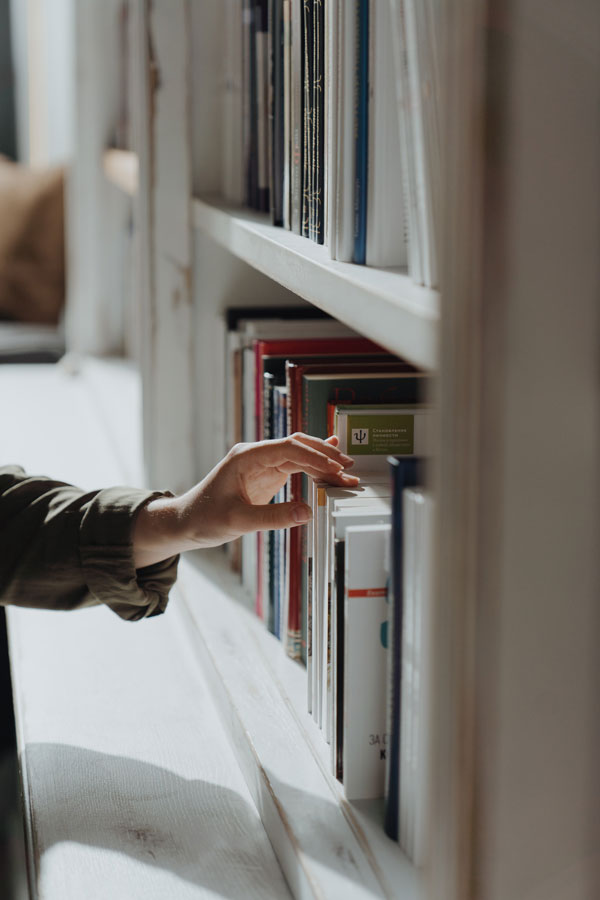
Our KLAS Users' Group officers contacted some KLAS users to ask them to share how their library / organization is faring and what policy, service, or other changes they may have enacted in response to library closure or limited staffing related to Covid19. We welcome submissions from any KLAS user who wants to share their experience during this time. Please contact Chandra Thornton, President, KLAS Users' Group or Drea Callicutt, Keystone Systems if you're interested in contributing a post.
Our next guest blog post in response to this request is from Sam Lundberg, Reader Advisor, New Mexico State Library, Library for the Blind & Print Disabled.
COVID-19 and the New Mexico Library for the Blind & Print Disabled
In large part because of our small size and flexible staff, the New Mexico LBPD has been able to stay open and continue service to all ~2,600 of our patrons. Of our 7 staff members, 5 are working from home and 2 are coming into the office daily, but never at the same time. One staffer handles all of our physical delivery, along with outgoing and incoming mail each morning. Meanwhile, the other staffer handles all DoD and equipment orders each afternoon. All of our RA work is done remotely, with our phones going directly to voicemail which we check repeatedly over the course of the day.
With New Mexico closing down hard and fast, we were able to see the shutdown coming and prepare as best we could. One of the biggest things we did was send out our newsletter early. We had a mostly complete draft ready, which we edited to include our COVID plans on the front page and rushed to get sent out. This, along with our voicemail recording, alerted each patron to the two basic facts that 1) we are still open, and 2) things will be delayed a bit. We had a minor panic attack when all staff were ordered to stay out of the State Library building on Friday of the first week, but we were quickly able to be designated as essential and limited staff allowed to return to the building on Monday.
One adjustment we made to accommodate our new staff schedule, with the help of Keystone, was to reschedule some of our nightly functions related to DoD so that they run mid-afternoon. This allows us to check in DoD cartridges and then have new orders created for those patrons the same day, preventing us from adding on an additional day of delay beyond the 4 days we are already quarantining all incoming mail.
Our patrons have generally been very understanding. We have several patrons who normally insist on a callback, or will call repeatedly until they catch a live RA, instead leave a voicemail with their order. I know I really appreciated this because those first couple weeks were rather frantic with patrons trying to order as many books as possible as nursing homes and other facilities across the state went into lockdown. We are right in the middle of our year-long DoD transition, and this provided great motivation to move many more patrons to DoD service. While we have not increased the cutoff values for our patrons across the board, we’re regularly manually assigning books well above our usual limits.
We are still calling back patrons when necessary, especially for BARD support and other more detailed problems. To avoid patrons being able to gather staff personal phone numbers, our RA responsible for the majority of callbacks set up a Google Voice temporary phone number, which she can set to “Do Not Disturb” during non-work hours. This has been an effective, if ad-hoc, solution.
This whole circumstance has offered up opportunities to tackle a few large projects that we’ve had on the back burner. Series sequence cataloging, flushing out our local subjects, and contacting inactive patrons, to name a few. We’ve also gotten involved in the Rating Unrated Books project, which is a nice change of pace when you need it.
I think we are in a stable place as a library and should be able to continue service at our current level for an extended time, although not at the highest level of service we’ve pushed hard for recently. There is outreach we’ve had to scrap and, while review of local narration projects continues, current narrations are on hold. Even though we cannot speak with every patron, we are still getting books out. Our staff will keep going like this as long as we need to, with the continued resilience and creativity necessary during these extraordinary times.
-
COVID-19 and the State Library of Kansas, Talking Books Service

Our KLAS Users' Group officers contacted some KLAS users to ask them to share how their library / organization is faring and what policy, service, or other changes they may have enacted in response to library closure or limited staffing related to Covid19. We welcome submissions from any KLAS user who wants to share their experience during this time. Please contact Chandra Thornton, President, KLAS Users' Group or Drea Callicutt, Keystone Systems if you're interested in contributing a post.
Our next guest blog post in response to this request is from Michael Lang, Director, State Library of Kansas, Talking Books Service.
March 16 – March 20: The Scramble
Kansas Talking Books began quarantining incoming items on Monday, March 16th. Our initial procedure was to disinfect all incoming items, scan them into a quarantine shelf, while wearing gloves, and let them sit for seven days. We did this for one week.
On Tuesday, March 17th at 4:00 p.m., Kansas Governor Laura Kelly held a press conference announcing the two week closure of all state offices beginning Saturday the 21st.
We emailed all of our residential facilities and individuals to alert them to our closure and encourage them to order more books and/or sign up for BARD. We identified heavy users and assigned them more books. We encouraged any patrons who called to order extra items. We discussed increasing out nightly cutoff for all patrons but weren’t sure we could get that many books pulled. For the next three days, we pulled twice our daily average. On Friday afternoon, Keystone ran a second round of nightly autoselect, and we did a full second pull.
Regrettably, this left patrons without email addresses and who didn’t call in underserved during, what would become, a four-week period with no outgoing items. Many of our patrons also don’t realize we are part of a state agency and might not have realized the governor’s order to close applied to us. This news was also overshadowed in the same press conference that she announced the closing of all school buildings for the rest of the school year.
March 21- April 5: The Shutdown
For the following two weeks, staff went home with instructions not to work. Our voicemail message started that we would reopen on the 6th. Our mail was delivered as usual to Emporia State University, where we are located, and held in the mailroom separated by date received. During this time, Emporia State University closed all buildings to the public.
I monitored emails and signed patrons up for BARD when possible.
April 6 – April 19: The Reset
State employees were instructed to return to work on April 6th, remotely if possible or on site if not possible but deemed safe, to provide missions essential functions. I returned to work with a skeleton crew of rotating circulation staff. Circulation staff checked in the books and equipment that we received during our two week closure.
RA staff began working from home, accessing their voicemails and returning call from their cells phones using blocked numbers. Eventually, we were able to get 3 of the 4 remote staff’s VOIP office phones hooked up in their homes. They are able to receive and return calls from their office numbers. The fourth person has a work issued cell phone so that she no longer has to call from a blocked/unknown number. RA staff continued to assign and reserve books for patrons during this time. They also encouraged patrons to try to use BARD as uncertainty in our operational status remained.
Additionally, with all campus buildings locked down, the postal service is not delivering to campus. ESU staff pick up the mail on Monday and Thursday. We were informed on April 13th that they would no longer be picking up our books and equipment but will still pick up our paper mail on Mondays and Thursdays. I must go to the post office to pick up our items.
April 20 – Present: Doing the Best that We Can
On April 20th, we began mailing out books and machines. In those first two days, circulation staff prepped and pulled almost 5,000 items and I delivered 56 bags of mail to the post office using my mother-in-law’s Ford Ranger. I am now delivering and picking up mail at the post office daily. We are allowing returned books and machines to sit untouched for at a minimum of four full days in our library before being handled by staff. Monday’s mail is sorted on Friday, Tuesday-Thursday on Monday and Friday’s mail gets sorted on Tuesday. It’s really messing with our daily procedures but we’re making it work.
The State Library has a contract with Splashtop, which provides remote access to desktop computers. During the week of April 20th we were able to get remote staff set up so that they can work on their desktop computers remotely from home. This allows them to access our network drives, networked printers, and some of our audio editing software. RA staff are also prepping for summer reading, cataloging, and editing audio as time allows. They will be working remotely until at least June 1.
-
COVID-19 and the Washington Talking Book & Braille Library
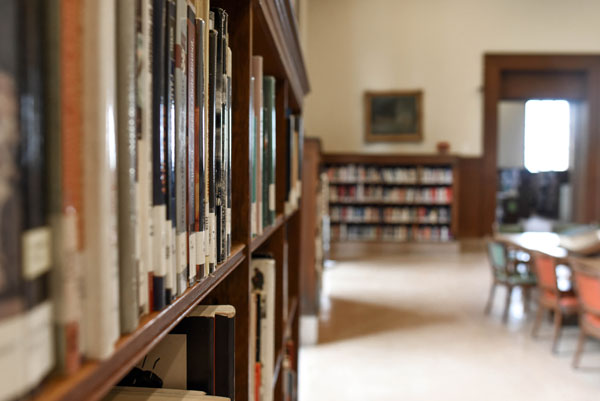
Our KLAS Users' Group officers contacted some KLAS users to ask them to share how their library / organization is faring and what policy, service, or other changes they may have enacted in response to library closure or limited staffing related to Covid19. We welcome submissions from any KLAS user who wants to share their experience during this time. Please contact Chandra Thornton, President, KLAS Users' Group or Drea Callicutt, Keystone Systems if you're interested in contributing a post.
Our first guest blog post in response to this request is from Danielle Miller, Director & Regional Librarian, Washington Talking Book & Braille Library.
COVID-19 and the Washington Talking Book & Braille Library
Gues
We are all experiencing a crisis most of didn’t imagine we would be in, and might not have felt adequately prepared to manage. These are unprecedented times and our libraries are vital resources for our patrons, yet many of us are finding we are having to stop, decrease, or modify services to our patrons in response to the pandemic. Washington State was the initial U.S. coronavirus epicenter. Home to the first case of coronavirus, and the first death on February 29th was in King County, where the Washington Talking Book & Braille Library (WTBBL) is located. On March 2nd there were 14 more cases, 6 more deaths, and schools began closing. In response to the growing concerns about patron, volunteer, and staff safety, that same day we implemented new procedures in handling our mail. All books, including DBs, braille, LP, and any new items, were checked in or processed using gloves. Incoming materials were then set aside and marked with the date and were quarantined (not put into circulation or inspection) for eight days. PCC or our proto Duplication on Demand patron cartridges were checked in like others, using gloves, and then the cartridges were disinfected and received new (previously unused, or not used for a period longer than 8 days) mailing containers. Machines were disinfected and also dated and set aside for a period of eight days before going back into circulation.On March 3rd we sent a message to our volunteers about all the safety measures we were implementing at WTBBL and letting them know they only needed to come if they felt comfortable doing so. We were open and operating as normal, but adding precautions for everyone’s safety. Our maintenance custodian was disinfecting all door handles, tables, water fountains, and frequently touched surfaces at least three times a day. The surfaces and chairs in the audio recording booths were being disinfected throughout the day. We added Kleenex and hand sanitizer in multiple locations throughout the building, as well as adding hand sanitizer and disinfecting wipes in the audio booths. We also put up notices in the building and at the volunteer sign-in station describing the precautions we were taking. We did see a decline in the number of volunteers coming to the library, but many still came, especially volunteer narrators and reviewers.
By March 15th, there were 772 confirmed cases and our Governor announced that all entertainment and recreational facilities, including bars and restaurants, were to close. The next day, WTBBL closed to the public and all volunteers. All staff continued to come to work and perform their regular duties and we continued circulation of materials as usual while following the safety measures previously outlined. On March 17th, the number of cases had jumped to 1,009 and we were anticipating that the Governor would soon issue a stay-at-home order. Worrying we would could be sent home at any time and not be able to send out materials, we decided to do a surge in our circulation to push our extra books to our patrons.
For all patrons with cutoffs between 4-16 books, we increased them all by four books. Our average daily circulation is between 1,200-1,500 items and we raised our daily circulation cutoff from 2,500 to 4,000. So on March 19, 20, 23, and 24, we did circs of over 4,000 digital books. More than we have ever done! This push got four additional books, over 16,000 cartridges to almost 4,000 patrons. We had started our push to get extra books out just in time, as on March 23rd, Governor Inslee announced a “stay home, stay healthy,” order effective March 25th, and currently in effect until May 5th but may yet be extended.
Beginning March 25th, all staff started working remotely. We are checking our voicemail remotely, encouraging people to sign up for BARD if that is an option for them, checking and answering our WTBBL email, approving BARD applications and providing BARD support by email, and posting to our social media. Some staff are also working on various cataloging projects, our Audio Book Production Department staff are working on editing and review as they can, and we have some transcription work for our Braille Department in progress.
For many staff, they are working on taking trainings and staying current on email. For the most part we have not been able to access the building, but as of April 15th, we were able to resume the delivery of our returned book mail and our First Class mail. On our first day we received 20 hampers of books. We will be receiving our mail delivery daily and I will be going in three days a week to process First Class mail. Unfortunately, we are unable to send out any books at this time. We are all hopeful we can begin to return to work and start circulating books again on May 5th. The digital divide experienced by so many of our users, and the many, many voicemails begging for books we can’t send demonstrate what an essential service our patrons believe we are. As soon as we are given the all clear, we’ll be ready to be all hands on deck to get through all our returned materials and start sending out books again, so that all may read.
-
COVID-19 KeyNotes Blog Posts to Date

COVID-19 has thoroughly upended almost all of our "typical" workdays, routines, and daily lives. It's affected each of us in very different, but very substantial ways. This Spring brought changes to how Keystone and many of our libraries operated. We've seen shifts in patron service models, circulation policies, and staffing scheduling and environments. In the last month, some agencies began to open back up and deal with the repercussions of limited staff, quarantining materials, backlogged items waiting to check-in, etc. while others may be facing another shift as state reevaluate their plans to reopen with the newest surge of cases. No matter where your organization or staff are in this process, we're doing our best to continue supporting you. Yet, we also know we aren't the ones dealing with the day-to-day, and only others in similar circumstances can relate and offer the best advice for you at this time. Therefore, today I am taking some time to again share relevant COVID-19 related KeysNotes blog posts from our staff as well from other KLAS Users.
The posts are in order from oldest to most recent.
Keystone Authored KeyNotes COVID-19 Related Posts:
- Important Coronavirus Info
- Working Remotely Tips & Tricks
- Working Remotely Tips & Tricks Part II
- A Note from James, plus Tips & Tricks Part III
- Tips & Tricks - Back to the Stacks
Yet, we also know we aren't the ones dealing with the day-to-day, and only others in similar circumstances can relate and offer the best advice for you at this time. Therefore, here are the words of your colleagues written in response to our request for input about what policy and procedural changes they've made in response to this unprecedented shift in how we all function.
KLAS Users Authored KeyNotes COVID-19 Related Posts:
- COVID-19 and the Washington Talking Book & Braille Library
- COVID-19 and the Florida Braille and Talking Book Libraries
- COVID-19 and New Mexico State Library, Library for the Blind & Print Disabled
- COVID-19 and the California Department of Education Press
- COVID-19 and State Library of Kansas, Talking Books Service
- COVID-19 and TN RCVI
- COVID-19 and the Arizona Talking Book Library & Instructional Resource Center
- COVID-19 and NC LBPH
-
Bonus Post
In March, Keystone staff shared something a bit more lighthearted and published some of their favorite recipes to cook in their home kitchens while self-isolating. You can check them out in this post: Keystone Quarantine Kitchen
-
COVID-19 Updates

Previously, we've shared a number of guest blog posts on how COVID-19 is affecting KLAS libraries and resource centers. Since then, there has been plenty of re-opening, re-closing, and re-evaluating as each state and all of their associated agencies work to find the best course of action.
We recently reached out to our original guest bloggers for an update on their situation. Read on to see how things have progressed in Washington, New Mexico, and Kansas.
And if you would like to share how your library / organization is faring, and what policy, service, or other changes you have enacted in response to Covid19, we still welcome submissions from any KLAS user. Please contact Chandra Thornton, Past President, KLAS Users' Group or Drea Callicutt, Keystone Systems if you're interested in contributing a post.
Sam Lundberg, New Mexico State Library for the Blind & Print Disabled
I said in my original post that New Mexico would be able to hold at current levels, and that's basically what we've done. Books are going out and coming in, processed by two staff members who are never in the building at the same time. We're also answering the phone live thanks to call forwarding and Google Voice, providing full RA service from home. Small, random things like sending out a paper application are more difficult than they were before, but we're in a sustainable place.
The only real change we've had is that we're finally wrapping up our conversion to DoD. After 9+ months of slowly transitioning patrons one conversation at a time, we're finally bulk converting our remaining patrons. It is very exciting to finally be going fully to Scribe for book delivery, although the fate of our carousel system is now very much an open question.
(Read the original New Mexico post)
Danielle Miller, Washington Talking Book & Braille Library
On June 2nd, our Governor approved a waiver request for the Washington Talking Book & Braille Library to begin circulating books and materials during Phase 1 of our “Safe Start” plan. On June 4th, we resumed circulation with four staff returning to work to join the director. We had over 40 mail bins of returned books and equipment that still needed to be checked in and thousands of patrons waiting for books. Working as a team, everything was checked in and everyone was served in record time. Circulation was operating normally, with all staff wearing PPE and following safety protocols. The director was still checking voicemail daily and responding to patrons, and most staff were still working remotely.
When our county moved into Phase 2, on June 29th, more staff were able to return to the library. We were able to start answering the phones and resume regular readers’ advisory. Some staff continue to work from home and the library is still closed to the public and to volunteers. We are busy answering phones, circulating books, continuing work in our Audio and Braille Departments, and all staff at the library are helping with book inspection daily. We are looking forward to the time we can have all of our staff together and slowly bring our volunteers back. Ensuring everyone’s safety is the highest priority, and we want to do what we can to avoid another disruption in circulation.
(Read the original Washington post)
Michael Lang, State Library of Kansas, Talking Books Service
Present: Still Doing the Best that We Can
We are still working with the model we implemented in April.
The circulation staff and I are working on site. We are allowing returned books and machines to sit untouched for a minimum of three full days in our library before handled by staff. The good news is that mail is again being delivered and picked up at our building by the USPS. No more daily runs to the post office in my mother-in-law’s truck.
RA staff are still working remotely; answering phone calls, emails, updating catalog records, editing audio, creating book lists, and looking for online continuing education opportunities. Our VOIP phones and splashtop connections are saving us from the early frustrations we were having. If there is something they need to do onsite, they can schedule a time with me to come in to work. They will return onsite fulltime when the following criteria have been met:
- The ESU Memorial Union is open
- Lyon County enters the phase out stage of Gov. Kelly’s Ad Astra recovery plan
- The State of Kansas enters the phase out stage of Gov. Kelly’s Ad Astra recovery plan
Our volunteer recording program is on hold until further notice. Circulation staff are recording our local magazines to keep them as current as possible.
Cases are currently trending upward in Kansas. On July 15, Kansas Governor Laura Kelly announced that public schools will not reopen until after Labor Day.
Emporia State University buildings are scheduled to reopen to the public on August 3rd, masks will be required for everyone on campus. Students will return beginning August 12th. They’ve shut off the water fountains in our building.
I feel like we’re managing to serve our patrons pretty well. The turnaround time is a little slower for books, but increasing cutoff limits for underserved patrons keeps most people in books. Most patrons have been very understanding. I think our biggest loss will be outreach. All outreach events for the year are cancelled. Trying to find new avenues to reach prospective patrons is difficult. If you’ve got any advice, we’d love the help.
(Read the original Kansas post)
-
Creating a Custom, Accessible Bibliography
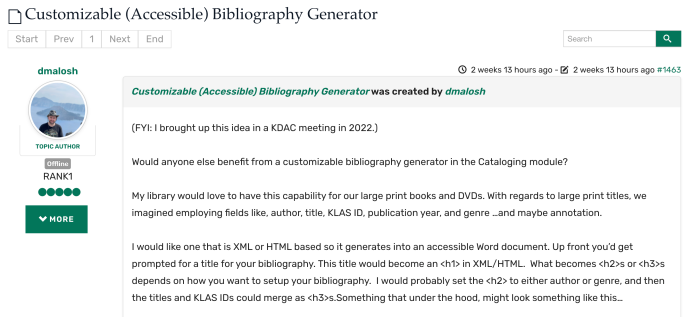
A Customizable (Accessible) Bibliography Generator, that was Dan Malosh of MN's request on the Forums about two weeks ago:

Would anyone else benefit from a customizable bibliography generator in the Cataloging module?
My library would love to have this capability for our large print books and DVDs. With regards to large print titles, we imagined employing fields like, author, title, KLAS ID, publication year, and genre …and maybe annotation.
This sparked a lot of interest... and then Sam Lundberg of NM chimed in to let us know about his rather ingenious method for doing just this, using KLAS's standard Export to Excel function and Word's Mail Merge.
The best part (at least in my opinion): once you have your Word template set up, you can simply select the exported Excel document from any catalog query or book search results to get a booklist that is nicely formatted to your exact specifications! The only thing this can't do automatically is generate the BARD link, though someone familiar enough with manipulating Excel data can add that prior to importing the data into Word, provided they do it the same way every time.
Learn how to create your booklists by following Sam's instructions, and give it a try with his example template and export:
- Mail Merge Booklist Instructions
- Example Booklist Template (on opening, you will be prompted to select your data source, which should be the Excel file below)
- Example KLAS Export
I don't know about you, but I'm imagining the possibilities already. If you build a template of your own for any KLAS export, I hope you'll share it with the Users' Group here!
-
Getting Smart about Series

This is a guest post by Sam Lundberg - Reader Advisor for the New Mexico State Library for the Blind & Print Disabled, and current President of the KLAS Development Advisory Committee.
We’ve had a lot of interest recently from across the community for Nightly AutoSelect to be more “series smart,” and not send book 3 in a series before a patron has had book 1. I’m among the chorus that’s been asking for this since the beginning of DoD, but I think it is worth talking about exactly how we want this to work. There are a lot of different ways that Nightly could be series smart, each with a different impact on the patron experience.
I’m going to lay out a few of the ways that I’ve thought of, along with advantages and possible drawbacks. I’d love to hear what others have been thinking on this subject, and I’m sure Keystone would appreciate knowing exactly what we want, rather than a vague mission to make it better.
As a preface, I have no idea how practical any of these solutions are from a programming side. I’ve tried to lay out specific rules that an algorithm could follow, but that doesn’t mean they would be easy, or even possible, to put in place. Some of these rules may also bog Nightly down to a crawl, requiring more time to run each night. This is a thought exercise to figure out exactly what we, as a community, want, rather than a menu of actual possibilities.
Option 1
1a) “First in the series only”
- When Nightly picks a title by Subject, it checks the “series sequence” field and excludes any book with a value greater than 1.
This is basically what is accomplished by libraries that use a “Sequel” subject code. Autoselect wouldn’t send out any sequels, which would exclude a large number of books from popular authors who write primarily or exclusively series. For context, I just ran a query and found that 321 of the 564 mystery titles we’ve added this year have a series sequence between 2 and 999.
Since this would be based on a Nightly setting, it would be library-wide rather than patron by patron. However, if KLAS also adds the ability to customize Nightly Functions by Serve Code, you could create an “AutoSelect No Sequels” serve code and an “AutoSelect All” serve code and select the appropriate one for each patron.
1b) “First or next in series only”
- When Nightly picks a title by Subject, it checks the “series sequence” field and excludes any book with a value greater than 1 UNLESS the patron has a “HasHad” for the previous book in the series..
Like 1a, except that subsequent books in a series can be sent if the patron is caught up in that series. This would help increase the available possible selections for series-heavy genres like Mystery. However, there is no mechanism for a patron to catch up on a series once they have missed a book, or for new patrons to get started on a long-standing series, without a specific request or Series preference.
Option 2
2a) “Not this book, but this series”
- When Nightly picks a title by Subject, it checks the “series” field and instead sends out the earliest book in that series not marked as “Has Had”.
The idea here is that, instead of sending out book 7 in a series, Nightly would go back and send out book 1 (or book 5 if the patron had the first four books already). This method would ensure that patrons are still able to access series books, but will always do so in order.
However, because the book Nightly initially found isn’t being sent out, there is no “Has Had” record added to that title, so Nightly will keep finding that book and sending books from that series over and over and over. How much of a problem this is will be very contextually dependent. If you use “Latest First” service for Subject, the books Nightly finds will change constantly.
But if you use “Earliest First” and don’t update your KLAS ID Ranges often, then nightly will check the same books every time. For instance, if your KLAS ID range starts at DB090000, Nightly will find Joanne Fluke and Stuart Woods at 90001 & 90002 respectively, so patrons with a mystery Subject preference would receive those entire series in rapid succession under this scheme. And given the prevalence of this sort of long-standing series, patrons may receive a large number of older titles as they are bumped back 20, 30, 50 books in a series.
2b) “Not this book, but where I left off this series”
- When nightly picks a title by Subject, it checks the “Series” field, locates the item with the highest series sequence in that series with a “Has Had” record, and sends the next book.
2a would fill in gaps if a patron skipped books or started with book 15. 2b wouldn’t fill in gaps, but would select the next book after the highest numbered book the patron has read.
For example, if a patron has read books 1, 2, 4, and 8 in a series and Nightly wants to send them book 10, 2a would instead send book 3, while 2b would send out book 9.
Option 3
3a) “Not this book, but this series, but not too often”
- When Nightly picks a title by Subject, it checks the “series” field and instead sends out the earliest book in this series not marked as “Has Had” UNLESS a book in this series is already in the Service Queue or a pending order, in which case Nightly will skip this title and series.
See Option 2, except that the frequency of a series being sent is gated by the length of the service queue, rather than the frequency the queue is refilled. If the patron’s service queue is 30 books long, you know there will be at least 30 books between each book in a series. However, this makes more sense for long running series than for short trilogies. I could see wanting to have different behaviors based on the length of the series, but that is getting complicated to keep track of. Keep in mind, this only applies to Subject and possibly Author. Books selected by Series, Request or Reserve would not have this same gating.
3b) “Not this book, but this series, but not too often, and picking up where I left off”
- When nightly picks a title by Subject, it checks the “Series” field and instead sends out the next book after the highest number book in the series marked as “Has Had”, or book 1 if the patron has not read any books in the series. UNLESS a book in this series is already in the service queue or a pending order, in which case nightly will skip this title and series.
Like 2b, this option just differentiates between filling in the gaps in a series or continuing from the highest numbered book a patron has read.
Option 4
4) “This book and this entire series”
- When nightly picks a title by Subject, it checks the “Series” field and queues all unread books in that series.
This could work well for shorter series, especially trilogies with a tight story, but would create a very hit-or-miss situation when dumping an entire 20+ book series. As with 2b, I worry that having a cutoff point for different behaviors would create confusion and unexpected outcomes. I think it would be possible to catalog our way out of this problem, flagging series as either a tight story or as episodic/procedural, but that isn’t something every library, including NM, could commit to. This rule would also need to differentiate between sequence 0 books (which are often more a collection and less a series) and numbered series.
Practically, I don’t think this could work as the default option given the sheer quantity of long-running series, but I could see this as an alternative that specific patrons would want to opt-in to.
Option 5
5) “Just care about what is in the Queue now”
- When Nightly picks a title by Subject, it checks the Service Queue for any books in the same Series. If another book in the queue is in the same Series and has a higher Series Sequence, the new book is placed ahead of the book already in the queue, rather than at the end.
Basically, if Nightly is trying to add book 2, and book 3 is already in the queue, book 2 is slotted just ahead of book 3, rather than at the end of the queue. This would only address the issue of patrons being sent books out of order in immediate proximity, such as when several books in a series are added at once by the NLS. Limited potential help but also limited potential harm.
So what option (listed above or something else entirely) would you want?
A big consideration is do we want this to be patron-by-patron? Or do we want it to be library-wide? And what do we want to be the default behavior vs. the opt-in behavior? Should this apply only to Subject selections, or Author as well?
Personally, I’m in favor of option 3b “Not this book, but this series, but not too often”. I think it addresses the core problem of books being sent out of order while avoiding any big drawbacks. It isn’t perfect, and will be clunky for short series, but that’s what Author Preferences and Reader Advisors are for. That said, I’m sure there are all sorts of circumstances I’m not accounting for that should be considered.
What are your thoughts? How, exactly, do you want Nightly to be series smart?
-
Hot off the Press: Part 1
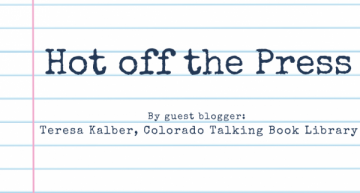
Welcome to the "Hot off the Press" blog series from guest blogger, Teresa Kalber. Teresa is the Network Systems Administrator at Colorado Talking Book Library. In this series, she will be sharing her library's experience being one of the first two KLAS libraries to implement NLS' Gutenberg equipment.
Hot off the Press: Part 1
A little delayed, but as promised we are sharing our experience of converting over to Gutenberg duplication as our main circulation method. This first installment will cover our pre-planning steps.
Our Director has been excited about using duplication on demand since she first heard about it. Knowing this and also knowing our KLAS server was reaching end of life and would not support KLAS 7.7, I began conversations with both our IT department and Keystone as early as December 2018 with a plan to have our server replaced by June 2019. I also started discussions with our security officer and our network administrator about DoD to ensure we would be able to use the equipment on our network without issues.
In May 2019, we found out we had been chosen to be the self-hosted pilot site for Gutenberg integration with KLAS. Our IT department had set-up a new virtual server for me and agreed to allow Keystone to submit an image to be placed on the server to run KLAS. Their caveat was that they would not provide support since the software didn’t conform to standards. Since they have never provided support for our servers anyway, I didn’t see this as a problem.
Things we needed to think about between finding out about the pilot and getting the Gutenberg equipment in September:
- Placing an order for additional mail cards beyond what NLS provides
- Preparing cartridges and containers to use for DoD
- Placing labels on unused cartridges and containers
- Stripping labels from used cartridges and containers and replacing with new labels
- Notification of patrons – we did a blurb in our newsletter and that was our only notification to patrons.
- Selecting patrons for the pilot (if you do one)
- When to start new patrons on DoD (we started new patrons when we started the pilot)
- When to zero out copy allotment so no new books come
- How to cut-over patrons once the pilot is complete
- Initial default number of books on a cartridge and default number of cartridges (We used 10 books/3 cartridges per patron as our default)
Both NLS and Keystone have documents of things to consider during planning stages. NLS also has a great overview of the necessary IT requirements. Once I received this document, I forwarded it to our Security Officer and Network Administrator to ensure there would be no problems in using the Gutenberg equipment on our network. I think opening these lines of communication early helped the process go more smoothly.
We were finally able to convert to KLAS 7.7 on August 19, 2019. This gave us about a month to iron out any issues before receiving our equipment from NLS on September 20th.
-
Hot off the Press: Part 2

"Hot off the Press" is blog series from guest blogger, Teresa Kalber. Teresa is the Network Systems Administrator at Colorado Talking Book Library. In this series, she will be shares her library's experience being one of the first two KLAS libraries to implement NLS' Gutenberg equipment.
The first post in the series is here: Hot off the Press: Part 1.
Hot off the Press: Part 2 - Setting up and testing the Gutenberg Equipment
Warning: a little geeky
On Friday, September 20th, our shipment of equipment arrived from NLS. We received:
- 2 Gutenberg workstations with monitors, keyboard, and mice
- 2 scanners – 1 for check out, 1 for returns
- 2 sets of 20 cartridge slot toaster racks
- 2 sets of USB hubs to attach the toaster racks to the computers
- 2 surge protector power strips
- Lexmark Printer
All of the items are clearly marked with tags to show you how to connect everything.
Back of the Toaster
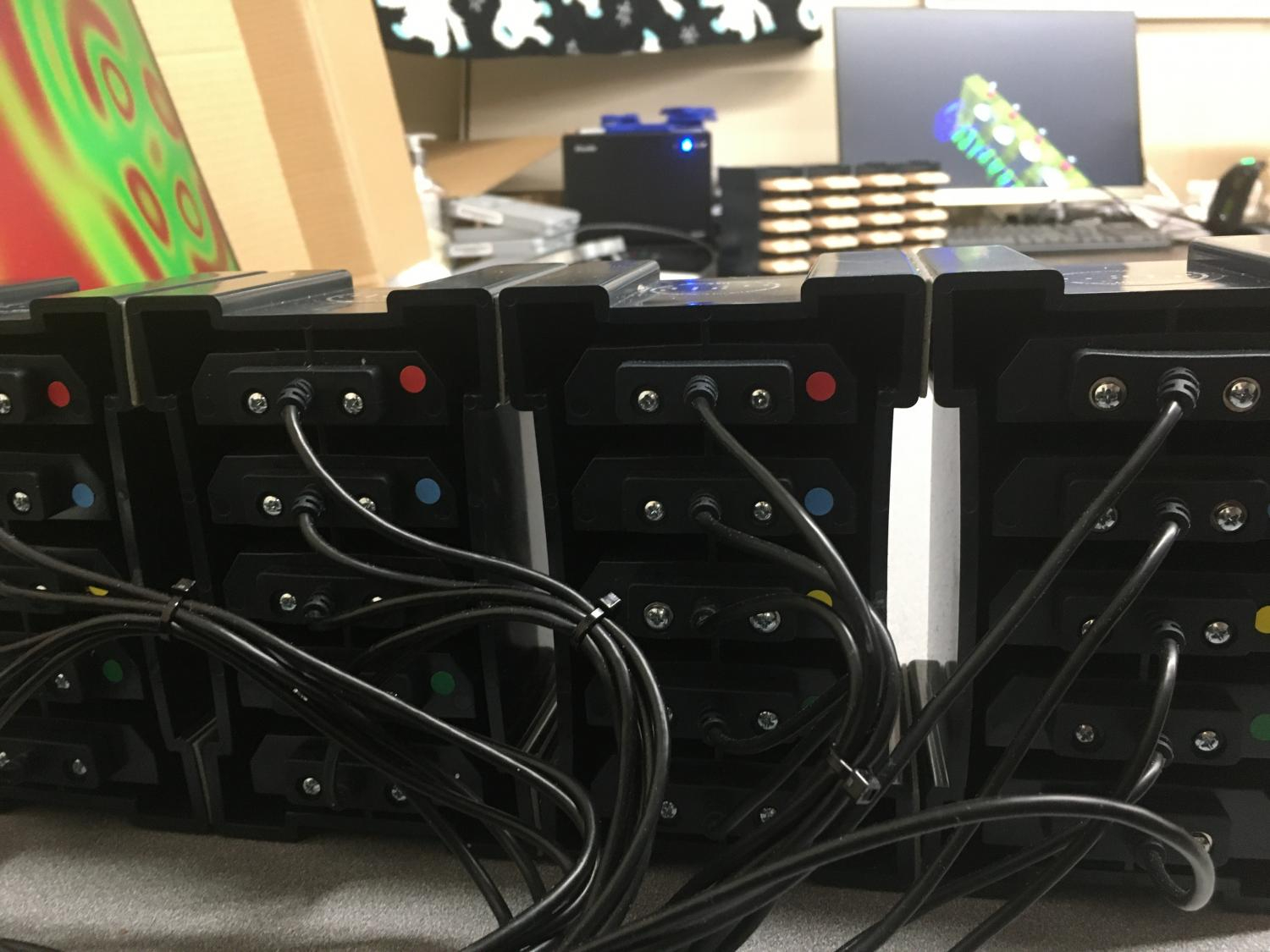
USB Hub
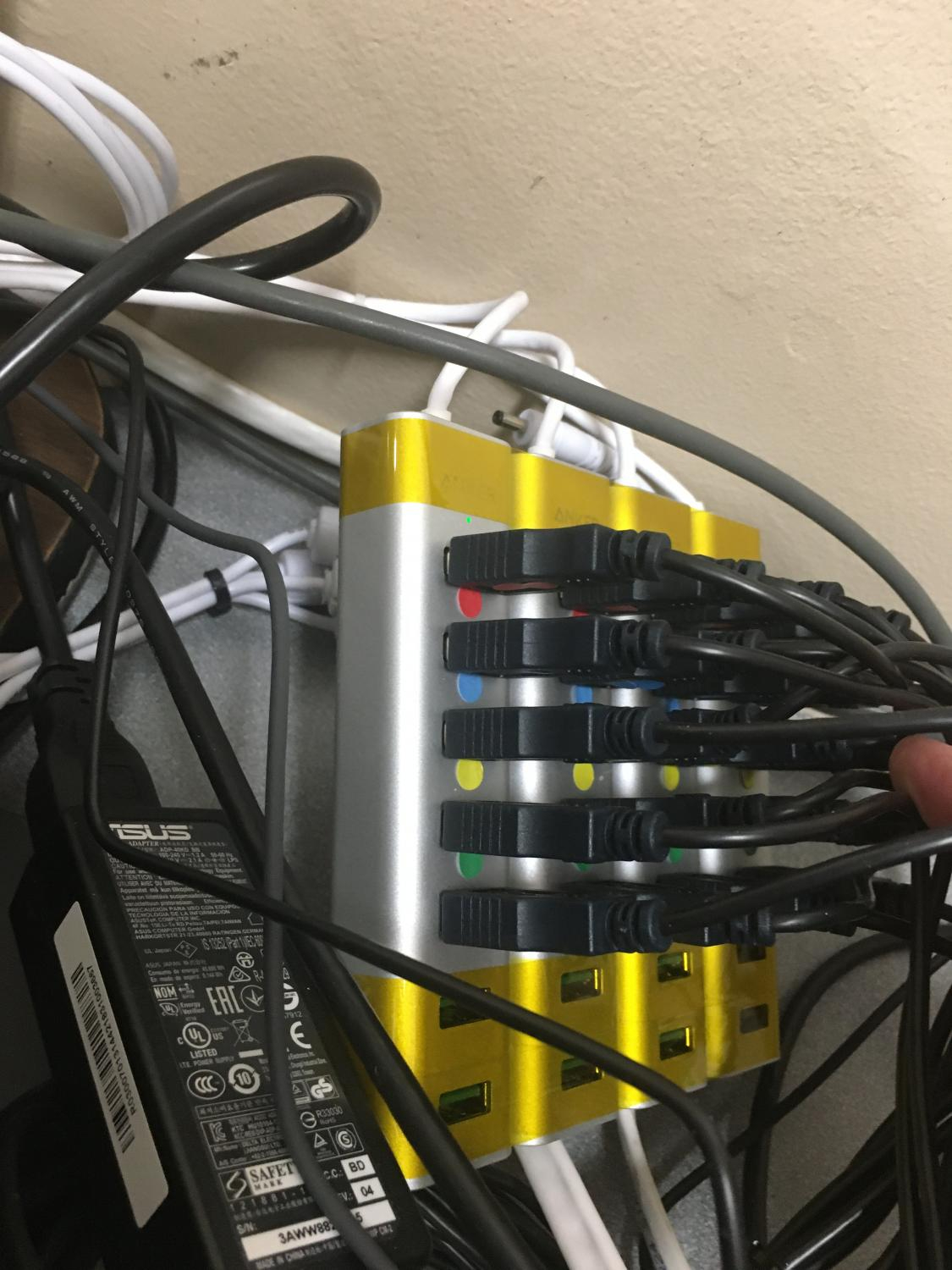
Hub Top
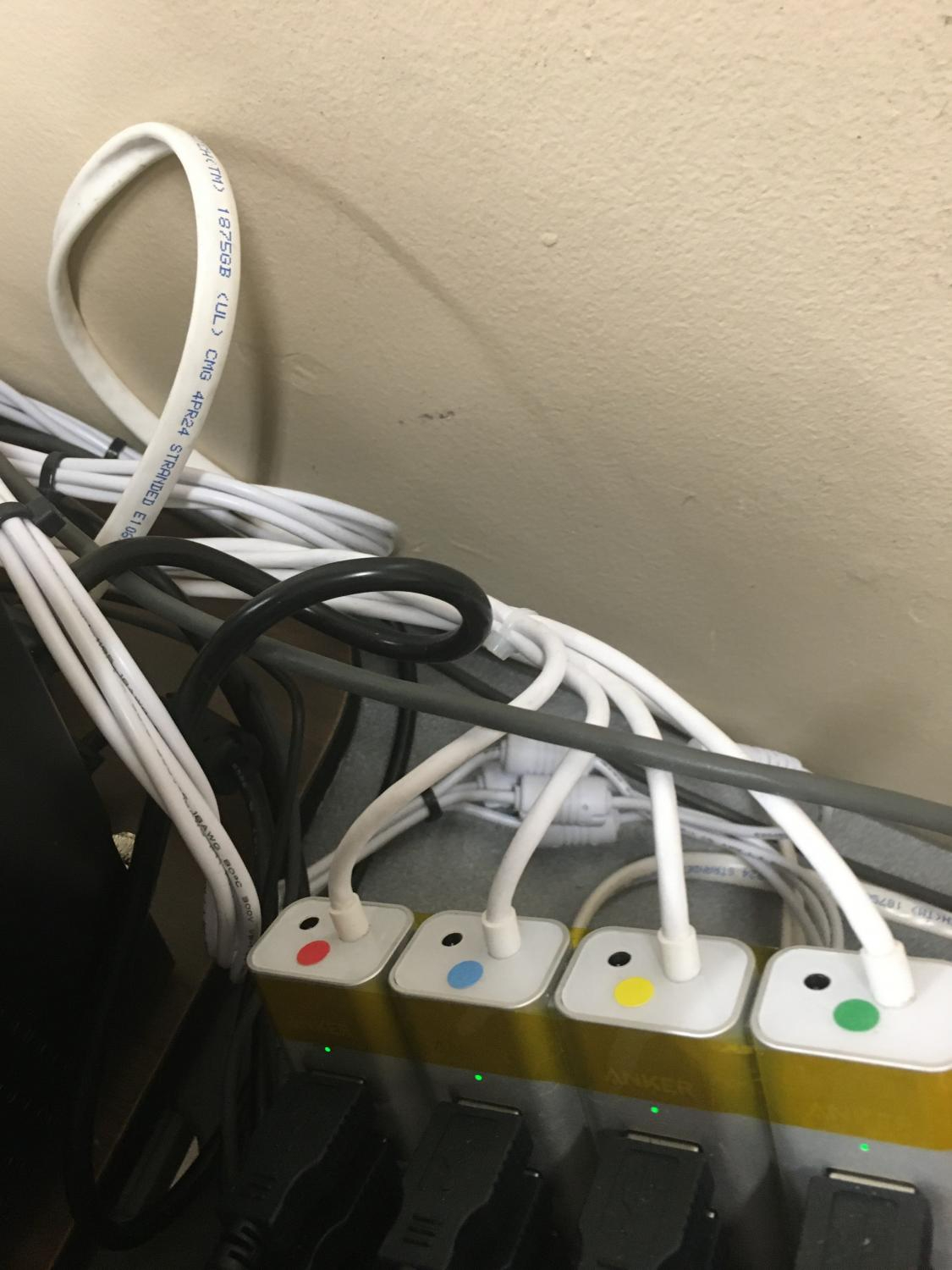
Computer Back
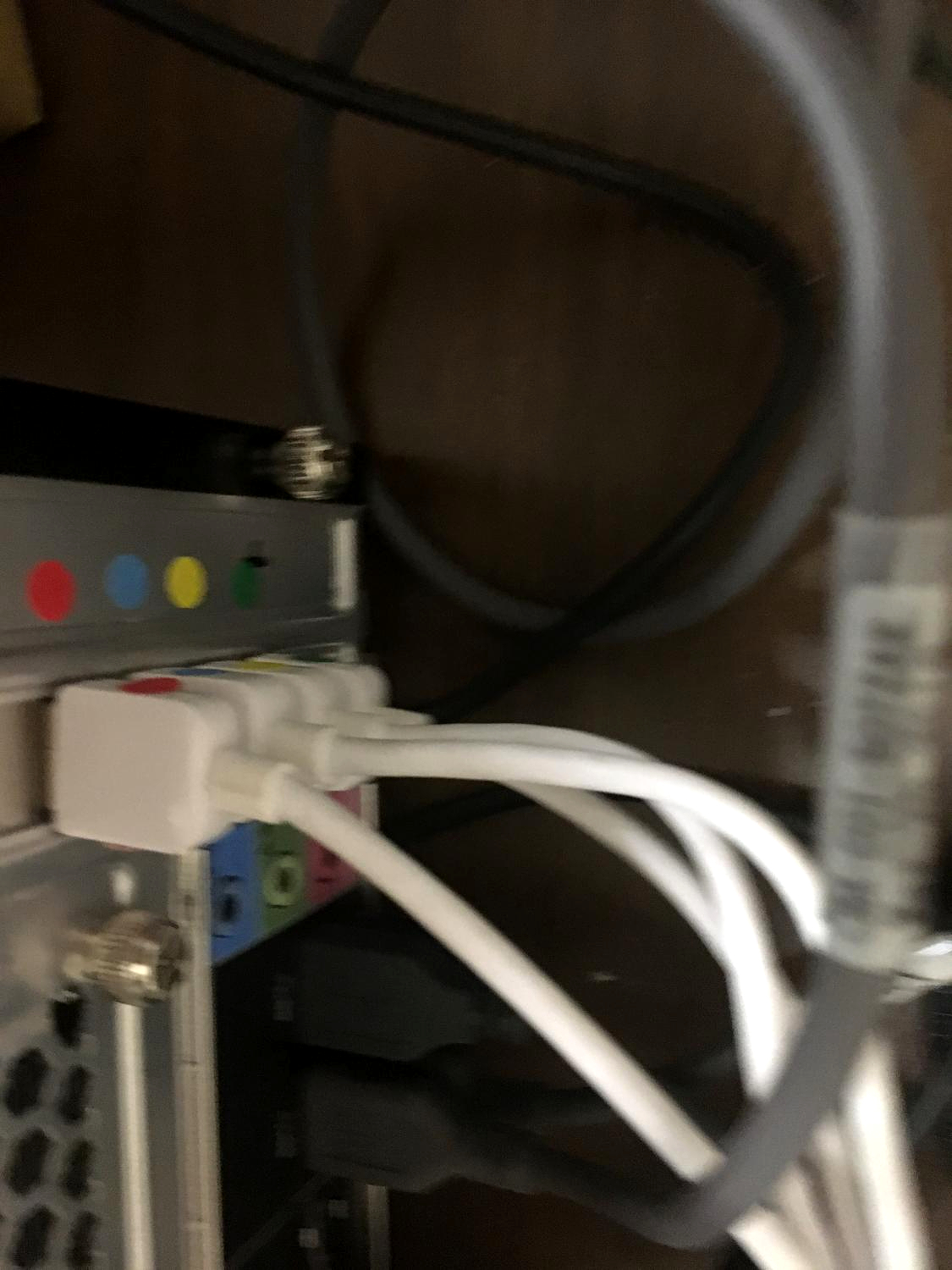
I immediately set-up the equipment so we could begin testing since I was scheduled to be on vacation the following week. NLS sends instructions in an email of what to do once the equipment arrives. One of the functions on the Gutenberg equipment is a “health check” app. In my hurry to get everything set-up, I forgot to run the health check and contacted both NLS and Keystone to let them know the equipment was installed and turned on.
Picture – HealthCheck_LI (screen shot of Gutenberg desktop with HealthCheck icon circled)
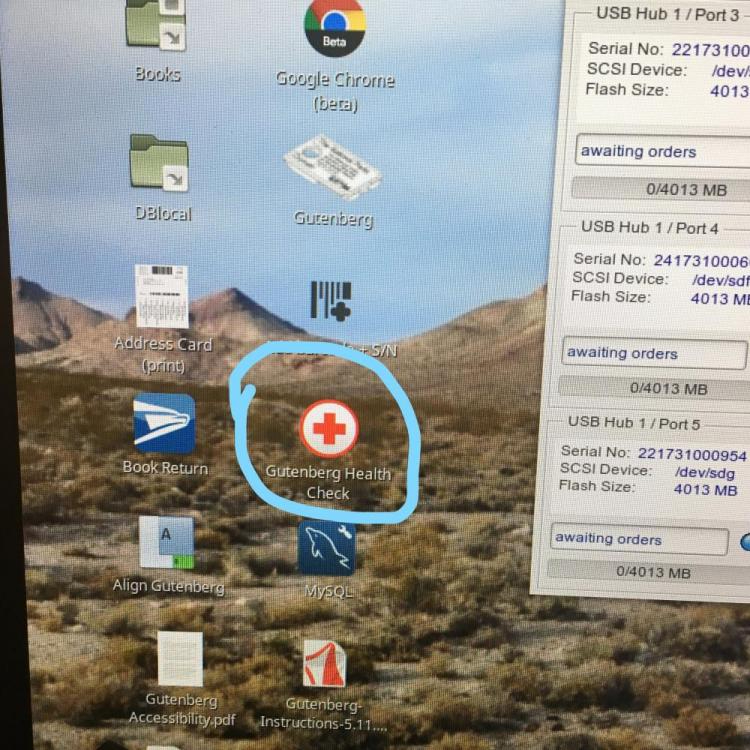
John C. contacted me and asked if I had run the health check since they were unable to connect to our Gutenberg equipment. Since we received two machines, NLS sets one up as the main computer (called CO1A and set with a static IP address) and the other as a secondary computer (called C01A-2). When I ran the health check I found that CO1A wasn’t connecting to the VPNs it needed to access.
I came in on Monday so we could troubleshoot the problem. I contacted our Network Administrator and had him monitor the firewall and traffic coming in and out of the Gutenberg machines using the static IP address we gave CO1A. He could not see any traffic being blocked or any firewall rules preventing access to the system. While I was on the phone with him, I was also having email conversations with NLS and Keystone staff about the problem.Finally, during a conference call with John C and Mark at Keystone, Mark made a comment about CO1A not connecting to our DNS server. I looked at the settings on the machine again and realized the IP address for our gateway server had been entered as the IP address for our DNS server. Once I corrected the IP address in the settings for CO1A rebooted it, everything starting working. Then Mark and John C worked their magic to finalize the connection and push a test order through the system.
So lesson learned – double check all the settings on the Gutenberg machines very carefully once they are received and set-up.
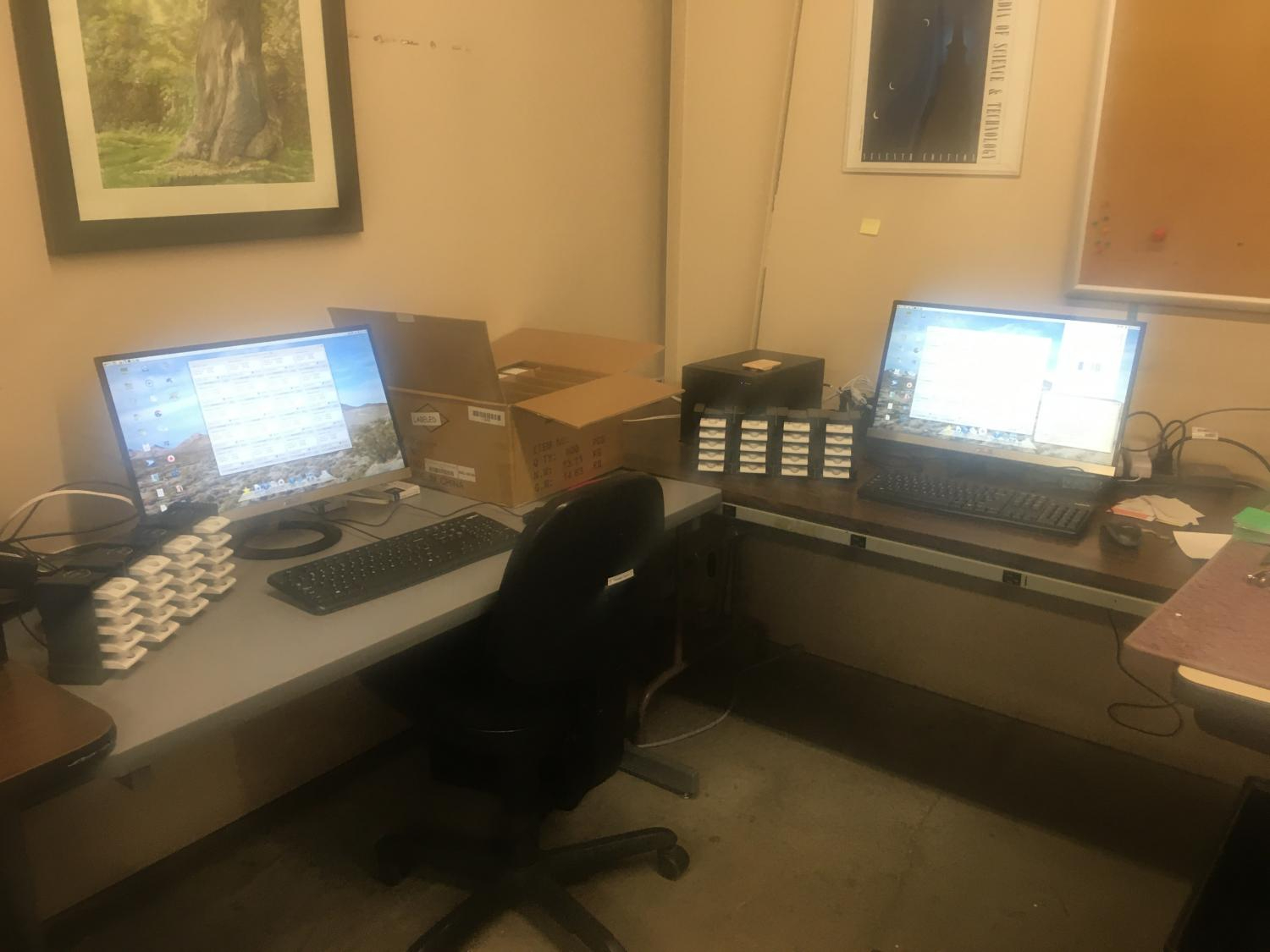
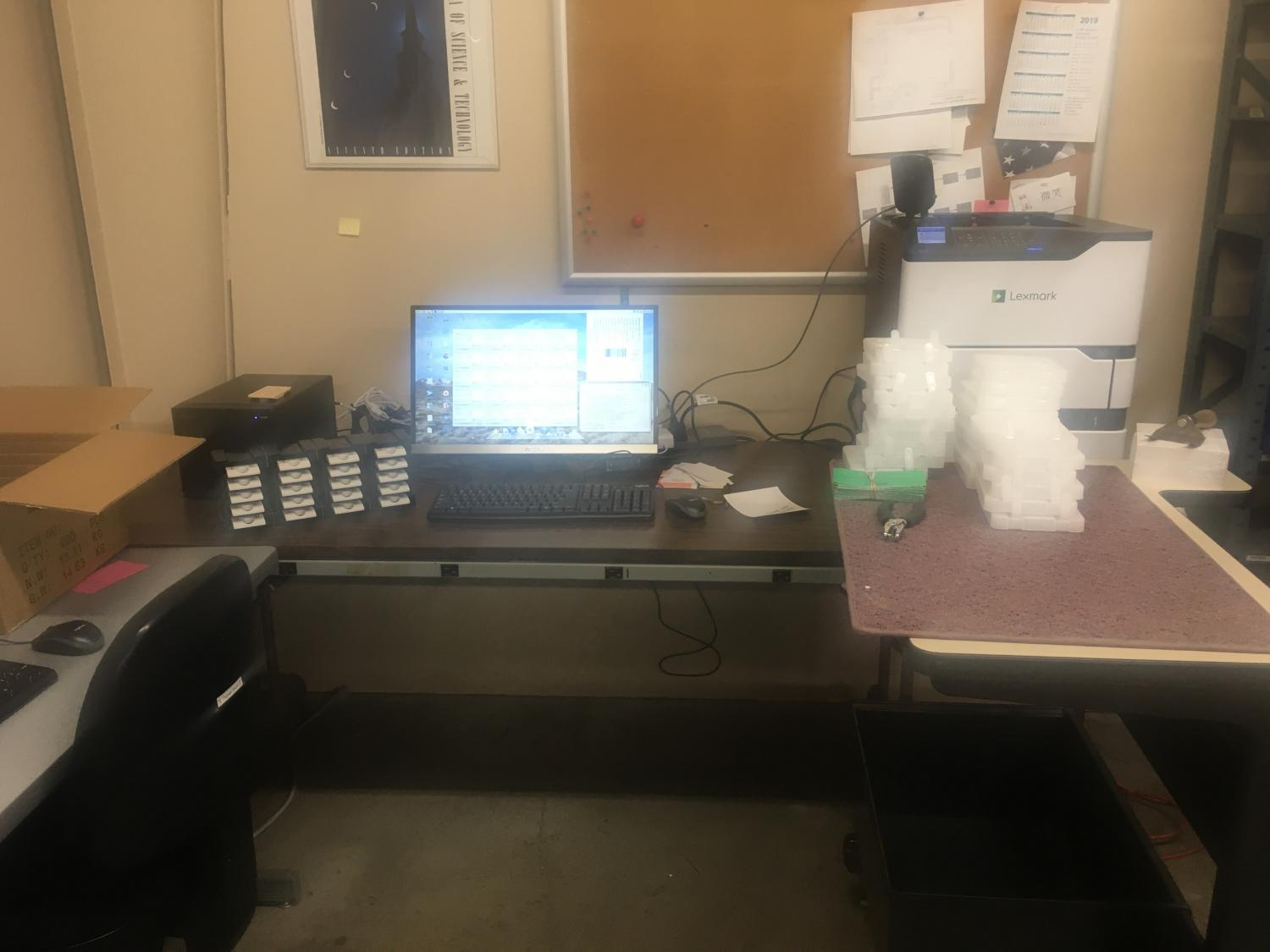
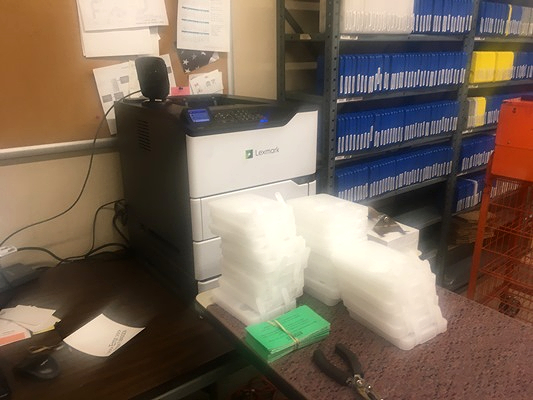
Up next: Testing the system
-
Hot off the Press: Part 3

"Hot off the Press" is blog series from guest blogger, Teresa Kalber. Teresa is the Network Systems Administrator at Colorado Talking Book Library. In this series, she will be shares her library's experience being one of the first two KLAS libraries to implement NLS' Gutenberg equipment.
The first two posts in the series are here:
Hot off the Press: Part 3, The Pilot
We received our equipment on a Friday and got everything working on the following Monday. Even though we had the system working on Sept. 23rd, we didn’t do any testing until I returned to the office on Sept. 30th.
When the Gutenberg system is first installed, it is operating in “sandbox” mode and is connected to the preview database for KLAS. We tried to push through a few orders for staff from the preview database, but they weren’t being copied onto cartridges. It was finally determined that KLAS and Gutenberg weren’t syncing with each other so the orders weren’t getting processed. Once Keystone restarted the syncing process, the orders came through. So on Oct. 2nd, we switched from sandbox to production mode so we could really test the system by starting the pilot.
We began the pilot with 50 existing patrons. For the existing patrons, we decided we would send out 2 cartridges with 3 books on them so we could get them back during the month long pilot and test the return part of the system too. We also made the decision to not send books out to new patrons about a week before we started the pilot. So since the end of September, all the new patrons have been put on the duplication model. New patrons were set-up to receive 3 cartridges with 10 books each on them.
On Oct. 3rd, we sent out our first 76 DoD cartridges! Yay!
The most consistent problem we noticed in the first few weeks of running Gutenberg was that daily KLAS and Gutenberg would stop syncing and we’d have to contact Keystone to restart the process. Because the problem was so consistent they wrote a temporary fix to automatically restart the service each morning to try to help with the process. Within 2 weeks of starting the pilot the problem has been solved and a fix applied during an update of KLAS.
We also had problems with serving walk-in patrons due to the time it would take to process an order. At first, Keystone and Gutenberg were only syncing every 15 minutes. So we would place an order and potentially have to wait up to 15 minutes to see if the order synced or not. If it didn’t sync and we needed to contact Keystone to restart the service, another 15 minutes would pass. Many times we would just pull individual books from the shelves and check them out using front desk since we are unable to assign books to a duplication patron. However, I believe the sync times have been cut down and we don’t usually have problems serving walk-ins now. An order for a walk-in patron, will be sent fairly quickly, even if we are still in the midst of making cartridges for the day. So mail room staff have to check mail cards as they scan each completed cartridge to look for the walk-in patron’s order.
A big learning curve came in how to best figure out how to set the nightly settings for DoD, since it works a little differently than it did before. When I would call Nancy, she would tell me “theoretically” it should work this way. I had to just make adjustments and then see what happened afterwards. Luckily our pilot patrons were very understanding during the process.
Other minor problem we encountered (that have all been fixed now):
- Service queue was adding all the books in a series, even if the patron had already had them before.
- Service queue was adding oldest books from request list, when we had the system set to add the newest books first.
- KLAS would allow orders larger than 4GB, which would then sit on Gutenberg since we didn’t have a cartridge big enough to copy the order
- Duplication orders were still being processed for patrons with a block on their account.
On Oct. 22nd, we participated in a conference with NLS, Keystone and Georgia to discuss how we felt things were going with our pilots. Both of us agreed that there were some minor problems, but nothing to prevent us from moving forward with beginning to convert the rest of our patrons over to DoD. We decided to start the conversion process at the beginning of November with the goal of being completely done with the conversion by the end of the year.
Statistics for our pilot (10/3 – 11/1):
- 644 cartridges sent out
- 192 patrons on DoD
- 91 cartridges returned
Up next: Converting existing patrons
-
Hot off the Press: Part 4

"Hot off the Press" is blog series from guest blogger, Teresa Kalber. Teresa is the Network Systems Administrator at Colorado Talking Book Library. In this series, she shares her library's experience being one of the first two KLAS libraries to implement NLS' Gutenberg equipment.
The first three posts in the series are here:
Hot off the Press: Part 4, Converting existing patrons
On November 4th, we began the process of converting our existing patrons over to the duplication model. We decided to go with our high-demand patrons (we have a separate patron type for high-demand) first, followed by students. Then we worked on converting the remainder of our patrons based on the number of books they were receiving. We initially set patrons up to get 1 cartridge with 10 books on it.
The first day I converted 100 patrons over. However, I realized that in order to complete the conversion by the end of the year, we would need to convert more than that each day. After discussing this with our mailroom supervisor, it was decided to convert 200 patrons each day.
As I ran queries in KLAS to find the patrons I needed to convert, I created Excel spreadsheets with lists of 200 patron ID’s and saved them as text files with the date I was converting them to DoD. Then I could pull the query into KLAS and use the Batch Update Profile tool to convert all 200 patrons at one time. Then I would scroll through the records to verify everything looked like it should.
One of the problems we had early on was duplication orders being sent to patrons that had a block on their account. As I was scrolling through the patrons, I would find those patrons and make their digital book service inactive so no cartridges would go out. Once the problem was fixed in KLAS, I changed all these patrons back to active for digital books, so those that had an automated date to restart service would get a cartridge.One week after a patron was converted to DoD, I would to run the same query again and bump their number of cartridges up to 2, and after another week, set them to our max of 3 cartridges. We gradually increased their number so they didn’t get all 3 cartridges at once and also to try and not overwhelm mailroom staff.
Most days, we were getting around 250 orders. We figured once our conversion was done, we would get somewhere between 300-400 cartridges per day. In order to try and meet those numbers and see how it would affect mailroom staff, I upped the number of patrons being converted to DoD to 300 per day.
Around mid-November, we noticed that KLAS and Gutenberg didn’t appear to by syncing again. Orders we created in the morning we not being sent to the Gutenberg machines. We were unable to serve walk-in patrons because their orders wouldn’t go through. After looking into the problem, we discovered that the batch manager was being overwhelmed with creating service queues for the patrons I had converted that morning. After figuring out this was the problem, I didn’t do conversions until after 3:30 in the afternoon. John C. at Keystone also mentioned putting something in place on KLAS so the service queue would function more efficiently (not sure if this was done or not).
Around the same time, NLS had problems with one of their servers, and our duplication order didn’t run in the morning. Because I had converted patrons in the morning, our order didn’t start copying until 3:30 in the afternoon. That caused us to have almost 1000 cartridges the next day. I guess it was a good test for how much duplication we can get done in a day.
With this large order, we realized the copying process went fairly quickly and we could easily make this many cartridges each day. However, printing the mailing cards took most of the day. So we decided to invest in a 2nd printer to alleviate the bottleneck at the printer.
On 12/3, I converted the remainder of our individual patrons to duplication and also the 200 organization accounts we had on automated digital book service. This resulted in our largest duplication order of 1,015 cartridges, although I’m not sure why. Once this conversion was done, I spent the next 2 weeks moving all the patrons up to 3 cartridges each. The process was completely done by 12/11/19, which worked out great since we needed to be closed the week on 12/16 due to a building maintenance issue.
Statistics for 11/4/2019 – 12/31/2019:
- 15,721 cartridges sent out
- 3,790 cartridges returned
- 4,711 patrons received duplication cartridges
Up next: Problems and ongoing issues
Page 1 of 2

